Shows
 Tłoczone z danychPraca szkodzi zdrowiu?Jaka praca jest dla nas najlepsza? Pasuje nam pracowanie na nocki, w weekendy, w trybie zmianowym? Preferujemy pracę hybrydową czy tradycyjny modelu w biurze? Co by się stało, gdybyśmy wszyscy pracowali tak samo, np. tylko od 8:00 do 16:00? Stalibyśmy się szczęśliwsi? Czy niestandardowe godziny pracy przekładają się na nieuzasadnioną różnice w zarobkach kobiet i mężczyzn? Jak z wiekiem zmieniają się nasze preferencje co do wykonywanej pracy? Czy pracownicy powinni mieć prawo, żeby się odłączyć od pracy po pracy?Jak się zmieniała nasz praca? Jest bardziej globalna, lepiej płatna, trudniejsza niż kiedyś? Czy...2025-06-2553 min
Tłoczone z danychPraca szkodzi zdrowiu?Jaka praca jest dla nas najlepsza? Pasuje nam pracowanie na nocki, w weekendy, w trybie zmianowym? Preferujemy pracę hybrydową czy tradycyjny modelu w biurze? Co by się stało, gdybyśmy wszyscy pracowali tak samo, np. tylko od 8:00 do 16:00? Stalibyśmy się szczęśliwsi? Czy niestandardowe godziny pracy przekładają się na nieuzasadnioną różnice w zarobkach kobiet i mężczyzn? Jak z wiekiem zmieniają się nasze preferencje co do wykonywanej pracy? Czy pracownicy powinni mieć prawo, żeby się odłączyć od pracy po pracy?Jak się zmieniała nasz praca? Jest bardziej globalna, lepiej płatna, trudniejsza niż kiedyś? Czy...2025-06-2553 min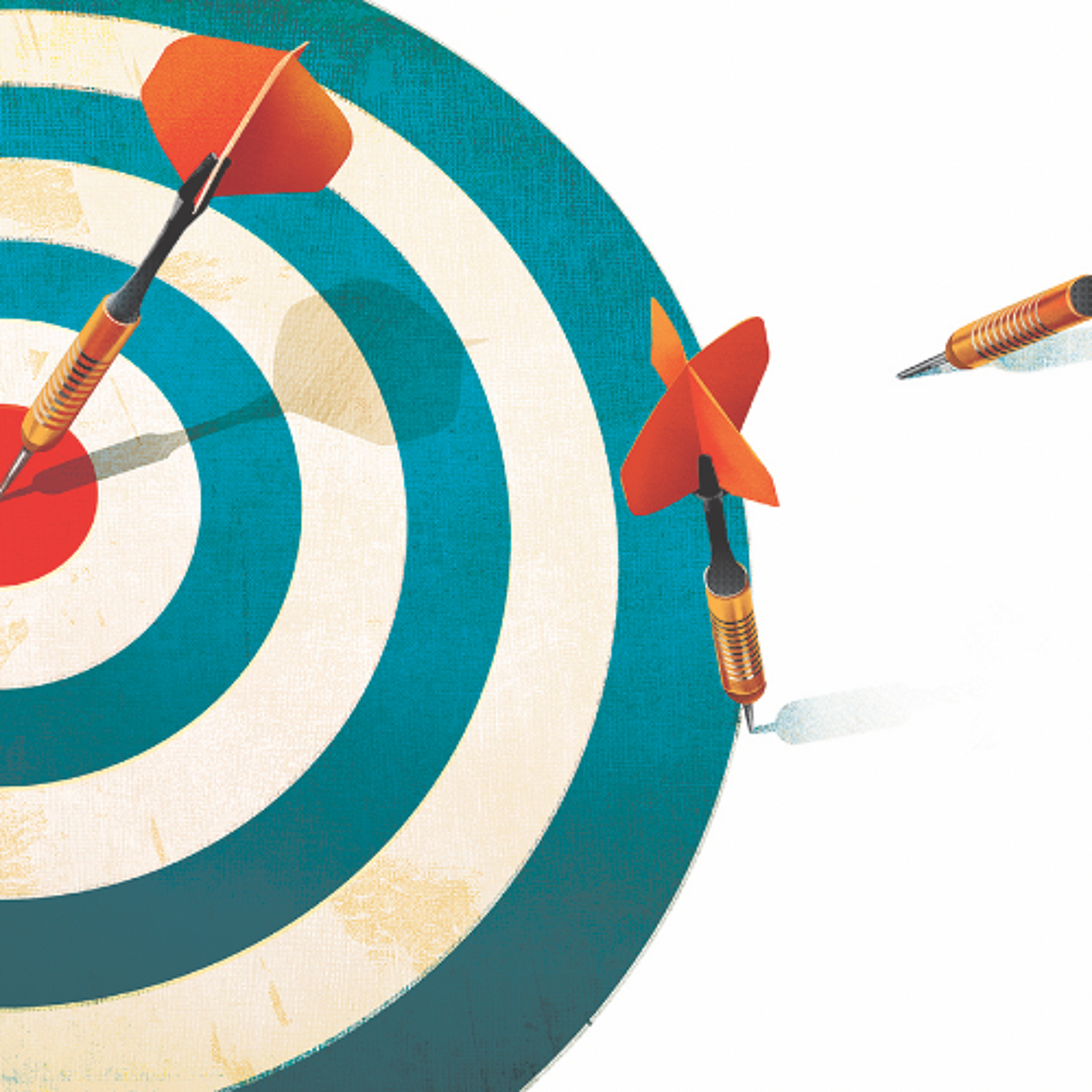 Fearonomics: confront and overcome your fears about the global economyNavigating industrial policy challenges and opportunities for emerging marketsIn the context of escalating geopolitical tensions, environmental challenges and rapid technological change, industrial policies – state-led strategic interventions designed to reshape an economy’s production structure – have made a comeback in both advanced economies and emerging markets. These policies seek to address global market failures such as climate change, foster economic growth, boost innovation and improve competitiveness. However, they have a mixed track record and pose complex challenges, which this panel will explore.
Tis discussion examined whether and how emerging markets can use industrial policy to drive sustainable economic growth, diversify economies and enhance competitiveness while navigating global geopolitical uncertainty and av...2025-05-221h 01
Fearonomics: confront and overcome your fears about the global economyNavigating industrial policy challenges and opportunities for emerging marketsIn the context of escalating geopolitical tensions, environmental challenges and rapid technological change, industrial policies – state-led strategic interventions designed to reshape an economy’s production structure – have made a comeback in both advanced economies and emerging markets. These policies seek to address global market failures such as climate change, foster economic growth, boost innovation and improve competitiveness. However, they have a mixed track record and pose complex challenges, which this panel will explore.
Tis discussion examined whether and how emerging markets can use industrial policy to drive sustainable economic growth, diversify economies and enhance competitiveness while navigating global geopolitical uncertainty and av...2025-05-221h 01 Fearonomics: confront and overcome your fears about the global economyRegional Economic Forecasts 2025Listen back to the launch of the latest EBRD’s Regional Economic Prospects launched in May 2025 during the 34th EBRD Annual Meeting and Business Forum in London.The discussion covered the latest economic forecasts for the regions where the EBRD invests. The EBRD’s Chief Economist, Beata Javorcik, and leading regional experts discussed the challenges confronting policymakers amidst rising geo-political tensions and intensifying pressures on government finances.
Speakers:
Jonathan Charles, Strategy Advisor
Sergey Guriev, Dean, Professor of Economics, London Business School
Beata Javorcik, Chief Economist, EBRD
Lord Jim O'Neill of Gatley2025-05-2259 min
Fearonomics: confront and overcome your fears about the global economyRegional Economic Forecasts 2025Listen back to the launch of the latest EBRD’s Regional Economic Prospects launched in May 2025 during the 34th EBRD Annual Meeting and Business Forum in London.The discussion covered the latest economic forecasts for the regions where the EBRD invests. The EBRD’s Chief Economist, Beata Javorcik, and leading regional experts discussed the challenges confronting policymakers amidst rising geo-political tensions and intensifying pressures on government finances.
Speakers:
Jonathan Charles, Strategy Advisor
Sergey Guriev, Dean, Professor of Economics, London Business School
Beata Javorcik, Chief Economist, EBRD
Lord Jim O'Neill of Gatley2025-05-2259 min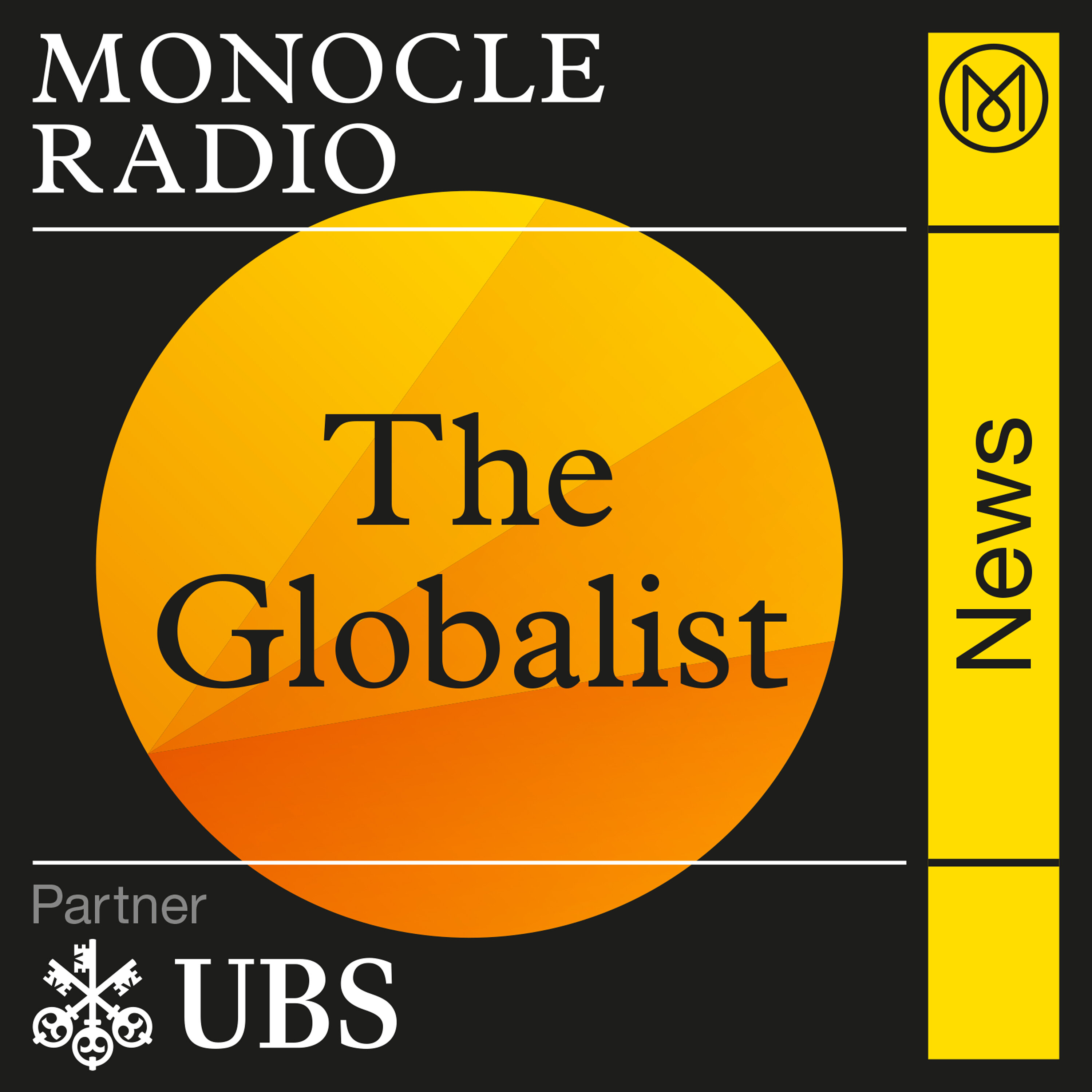 The GlobalistUK-EU summit and election watchThe UK and the EU hold their first post-Brexit summit and the election results from Romania and Portugal. Plus: EBRD’s chief economist, Beata Javorcik, tech news and Melbourne Design Week.See omnystudio.com/listener for privacy information.2025-05-191h 00
The GlobalistUK-EU summit and election watchThe UK and the EU hold their first post-Brexit summit and the election results from Romania and Portugal. Plus: EBRD’s chief economist, Beata Javorcik, tech news and Melbourne Design Week.See omnystudio.com/listener for privacy information.2025-05-191h 00 The Economics ShowUpdate from Davos: Can industrial policy really work? With Beata JavorcikSam Fleming is the FT’s Economics Editor, and this week he is reporting from the World Economic Forum at Davos, where much of the talk is about protectionism and industrial policy. Today on the show, Sam speaks to Beata Javorcik, the chief economist of the European Bank for Reconstruction and Development. They discuss the history of industrial policy -- and what it takes to get it right.Subscribe to The Economics show on Apple, Spotify, Pocket Casts or wherever you listen.Read a transcript of this episode on FT.com Ho...2025-01-2430 min
The Economics ShowUpdate from Davos: Can industrial policy really work? With Beata JavorcikSam Fleming is the FT’s Economics Editor, and this week he is reporting from the World Economic Forum at Davos, where much of the talk is about protectionism and industrial policy. Today on the show, Sam speaks to Beata Javorcik, the chief economist of the European Bank for Reconstruction and Development. They discuss the history of industrial policy -- and what it takes to get it right.Subscribe to The Economics show on Apple, Spotify, Pocket Casts or wherever you listen.Read a transcript of this episode on FT.com Ho...2025-01-2430 min VoxTalks EconomicsTrading around geopoliticsAfter Russia after invaded Ukraine, 45 countries imposed sanctions. Turkiye was among those that did not. Have Turkiye’s exporters filled the gap created by the reduction in exports from other sources? If so, how do they manage the reputational and operational risks in trading with Russia? Giancarlo Corsetti, Banu Demir and Beata Javorcik have used firm-level data to discover whether Turkiye’s firms have been “Trading around geopolitics”. They tell Tim Phillips why imposing trade sanctions can be like “squeezing a balloon”.2024-12-1318 min
VoxTalks EconomicsTrading around geopoliticsAfter Russia after invaded Ukraine, 45 countries imposed sanctions. Turkiye was among those that did not. Have Turkiye’s exporters filled the gap created by the reduction in exports from other sources? If so, how do they manage the reputational and operational risks in trading with Russia? Giancarlo Corsetti, Banu Demir and Beata Javorcik have used firm-level data to discover whether Turkiye’s firms have been “Trading around geopolitics”. They tell Tim Phillips why imposing trade sanctions can be like “squeezing a balloon”.2024-12-1318 min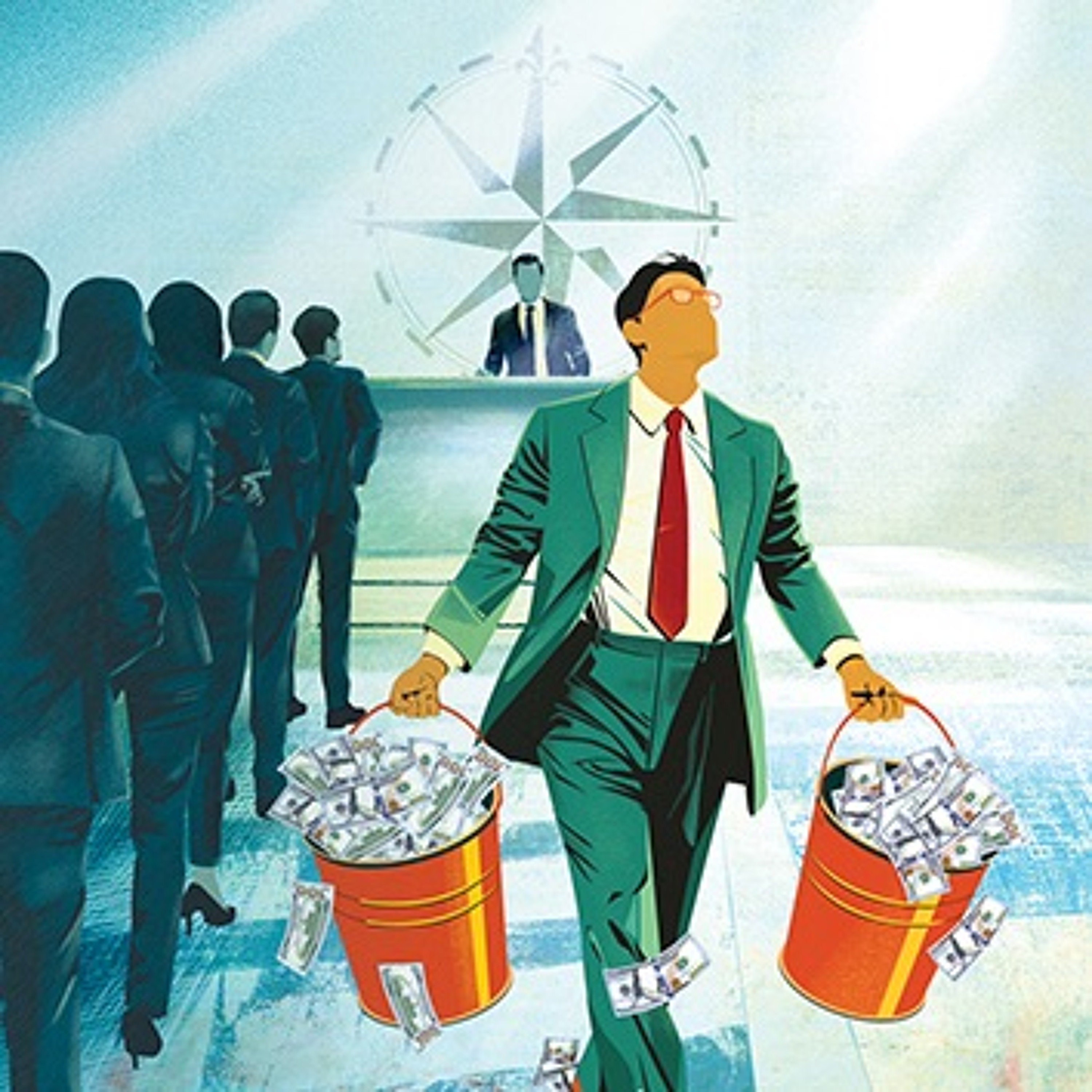 Fearonomics: confront and overcome your fears about the global economyLaunch Of The EBRD Transition Report 2024 - 25 Navigating Industrial PolicyListen to the discussion on the industrial policy at the launch of the EBRD Transition Report, moderated by Richard Porter, EBRD Managing Director of Communications. It featured:
Joseph Stiglitz, Nobel laureate in economics and Professor at Columbia University
Rana Foroohar, global business columnist and associate editor at the Financial Times
Jeromin Zettelmeyer, Director of Bruegel, the European Union’s economic think tank
Beata Javorcik, EBRD Chief Economist
The Transition Report report takes an extensive look at industrial policies in the EBRD regions and beyond. Such policies, which are aimed at changing the sectoral composition of production in an economy, have seen...2024-11-271h 30
Fearonomics: confront and overcome your fears about the global economyLaunch Of The EBRD Transition Report 2024 - 25 Navigating Industrial PolicyListen to the discussion on the industrial policy at the launch of the EBRD Transition Report, moderated by Richard Porter, EBRD Managing Director of Communications. It featured:
Joseph Stiglitz, Nobel laureate in economics and Professor at Columbia University
Rana Foroohar, global business columnist and associate editor at the Financial Times
Jeromin Zettelmeyer, Director of Bruegel, the European Union’s economic think tank
Beata Javorcik, EBRD Chief Economist
The Transition Report report takes an extensive look at industrial policies in the EBRD regions and beyond. Such policies, which are aimed at changing the sectoral composition of production in an economy, have seen...2024-11-271h 30 Al ContadoEconomía de Rusia es imbatible: lo confiesan desde una Europa sometida y arruinada por EEUULa economista jefe del Banco Europeo para la Reconstrucción y el Desarrollo (BERD), Beata Javorcik, tuvo una revelación: la economía de Rusia ha demostrado ser más resistente de lo que Occidente esperaba y sigue creciendo pese a las medidas restrictivas. Así comentó los últimos indicadores económicos rusos.La triste realidad del vasallo
En este contexto, la teniente coronel retirada de la Fuerza Aérea de EEUU y exanalista del Pentágono, Karen Kwiatkowski, declaró que Europa cayó en la trampa política de EEUU al rechazar, a su propia c...2024-05-2924 min
Al ContadoEconomía de Rusia es imbatible: lo confiesan desde una Europa sometida y arruinada por EEUULa economista jefe del Banco Europeo para la Reconstrucción y el Desarrollo (BERD), Beata Javorcik, tuvo una revelación: la economía de Rusia ha demostrado ser más resistente de lo que Occidente esperaba y sigue creciendo pese a las medidas restrictivas. Así comentó los últimos indicadores económicos rusos.La triste realidad del vasallo
En este contexto, la teniente coronel retirada de la Fuerza Aérea de EEUU y exanalista del Pentágono, Karen Kwiatkowski, declaró que Europa cayó en la trampa política de EEUU al rechazar, a su propia c...2024-05-2924 min Fearonomics: confront and overcome your fears about the global economyEBRD Transition Report 2023-24 live launchListen to the live launch of the EBRD Transition Report launch.
The global shift to net zero will require major structural changes in economies, as well as extensive change in daily lives. The scale of the transition is unprecedented: from the rush to source critical raw materials to the reconfiguration of global supply chains; from the rise of green skills in the workforce to the development of environmentally sustainable housing markets.
The EBRD Transition Report 2023-24: Transitions big and small, published today, offers revealing insights into the way macro-level trends leading to carbon neutrality impact the types of job sought...2023-11-221h 24
Fearonomics: confront and overcome your fears about the global economyEBRD Transition Report 2023-24 live launchListen to the live launch of the EBRD Transition Report launch.
The global shift to net zero will require major structural changes in economies, as well as extensive change in daily lives. The scale of the transition is unprecedented: from the rush to source critical raw materials to the reconfiguration of global supply chains; from the rise of green skills in the workforce to the development of environmentally sustainable housing markets.
The EBRD Transition Report 2023-24: Transitions big and small, published today, offers revealing insights into the way macro-level trends leading to carbon neutrality impact the types of job sought...2023-11-221h 24 VoxTalks EconomicsWill deglobalisation lead to a new Cold War?When the Soviet Union collapsed, the narrative was that we were at “the end of history”. Now we have changed our minds: globalization is in retreat, and we're entering a new Cold War. Is this new narrative true? At the Chicago Booth School Economic Experts Conference 2023, Tim Phillips speaks to Beata Javorcik and Sergei Guriev about shifting geopolitics and the global economy.2023-11-0317 min
VoxTalks EconomicsWill deglobalisation lead to a new Cold War?When the Soviet Union collapsed, the narrative was that we were at “the end of history”. Now we have changed our minds: globalization is in retreat, and we're entering a new Cold War. Is this new narrative true? At the Chicago Booth School Economic Experts Conference 2023, Tim Phillips speaks to Beata Javorcik and Sergei Guriev about shifting geopolitics and the global economy.2023-11-0317 min Hoshimov Iqtisodiyoti (Hoshimov's Economics)Beata Javorcik - Economic Transformation: The Power of International Trade & InvestmentsExploring Economic Development & Global Dynamics with EBRD Chief Economist and Oxford Professor Beata JavorcikIn this interview, we delve into critical issues shaping economic development, trade, and investments.We discussed range of topics:Attracting Foreign Direct Investments (FDIs): Strategies to attract FDIs and the knowledge they bring to the recipient economy.Inward-Looking Policies: the challenges posed by inward-focused economic policies and their impact on development.Migration Dynamics: Insights into the complexities of migration and its role in economic developmentWar and Sanctions: Russia's global economic role and the repercussions...2023-10-021h 10
Hoshimov Iqtisodiyoti (Hoshimov's Economics)Beata Javorcik - Economic Transformation: The Power of International Trade & InvestmentsExploring Economic Development & Global Dynamics with EBRD Chief Economist and Oxford Professor Beata JavorcikIn this interview, we delve into critical issues shaping economic development, trade, and investments.We discussed range of topics:Attracting Foreign Direct Investments (FDIs): Strategies to attract FDIs and the knowledge they bring to the recipient economy.Inward-Looking Policies: the challenges posed by inward-focused economic policies and their impact on development.Migration Dynamics: Insights into the complexities of migration and its role in economic developmentWar and Sanctions: Russia's global economic role and the repercussions...2023-10-021h 10 FearonomicsWar and post-war economics: lessons for UkrainePolicymakers and investors need to be aware of the short and long-term challenges Ukraine faces during the war and those that the country will have to deal with in the post-war period.
The panel takes a broad look at the historical experience of war and peace and examines the impact that armed conflicts have had on economic performance and political, social and population trends, both during the wars and after they end.
This retrospective aims to provide some indication of the sheer scale of the challenges that Ukraine has been subject to and will face...2023-05-261h 00
FearonomicsWar and post-war economics: lessons for UkrainePolicymakers and investors need to be aware of the short and long-term challenges Ukraine faces during the war and those that the country will have to deal with in the post-war period.
The panel takes a broad look at the historical experience of war and peace and examines the impact that armed conflicts have had on economic performance and political, social and population trends, both during the wars and after they end.
This retrospective aims to provide some indication of the sheer scale of the challenges that Ukraine has been subject to and will face...2023-05-261h 00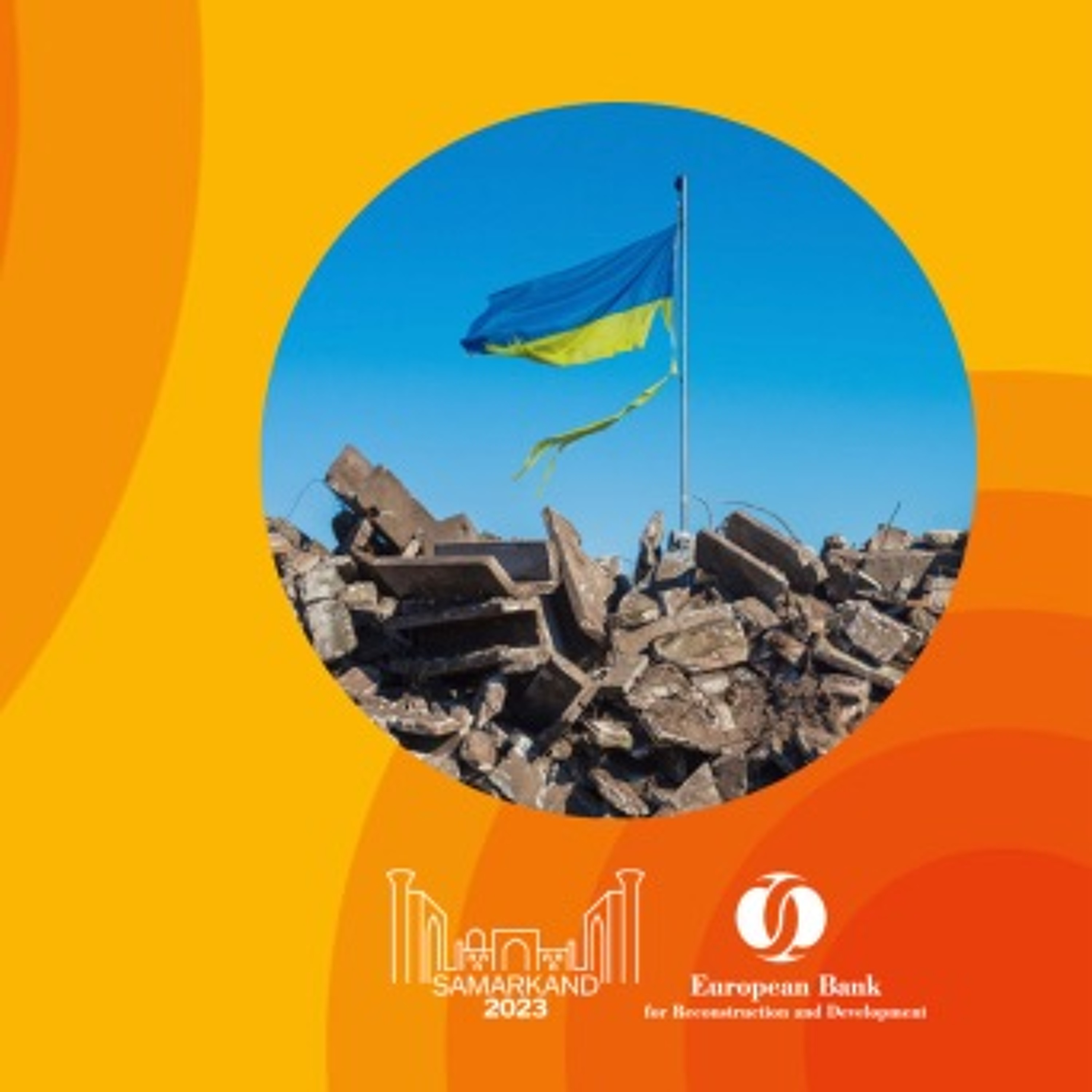 Fearonomics: confront and overcome your fears about the global economyWar And Post - War Economics Lessons For UkrainePolicymakers and investors need to be aware of the short and long-term challenges Ukraine faces during the war and those that the country will have to deal with in the post-war period.
This panel takes a broad look at the historical experience of war and peace and examines the impact that armed conflicts have had on economic performance and political, social and population trends, both during the wars and after they end.
This retrospective provides some indication of the sheer scale of the challenges that Ukraine has been subject to and will face during the reconstruction stage. On that basis...2023-05-261h 00
Fearonomics: confront and overcome your fears about the global economyWar And Post - War Economics Lessons For UkrainePolicymakers and investors need to be aware of the short and long-term challenges Ukraine faces during the war and those that the country will have to deal with in the post-war period.
This panel takes a broad look at the historical experience of war and peace and examines the impact that armed conflicts have had on economic performance and political, social and population trends, both during the wars and after they end.
This retrospective provides some indication of the sheer scale of the challenges that Ukraine has been subject to and will face during the reconstruction stage. On that basis...2023-05-261h 00 FearonomicsRegional Economic Prospects 2023The much-anticipated EBRD Regional Economic Prospects were back in the new panel discussion format for a special EBRD Annual Meeting 2023 edition. The interactive discussion covered the latest economic forecasts for the regions where the EBRD invests. EBRD Chief Economist Beata Javorcik discussed with outstanding regional experts the extraordinary challenges that policymakers are confronted with in the world of relentless inflationary pressures and repeated economic crises.
Keynote speaker
Beata Javorcik, Chief Economist, EBRD
Moderator
Jonathan Charles, Strategic Communications Consultant and Broadcaster
Speakers
Sergei Guriev, Professor of Economics, Institut d'Études Politiques2023-05-2655 min
FearonomicsRegional Economic Prospects 2023The much-anticipated EBRD Regional Economic Prospects were back in the new panel discussion format for a special EBRD Annual Meeting 2023 edition. The interactive discussion covered the latest economic forecasts for the regions where the EBRD invests. EBRD Chief Economist Beata Javorcik discussed with outstanding regional experts the extraordinary challenges that policymakers are confronted with in the world of relentless inflationary pressures and repeated economic crises.
Keynote speaker
Beata Javorcik, Chief Economist, EBRD
Moderator
Jonathan Charles, Strategic Communications Consultant and Broadcaster
Speakers
Sergei Guriev, Professor of Economics, Institut d'Études Politiques2023-05-2655 min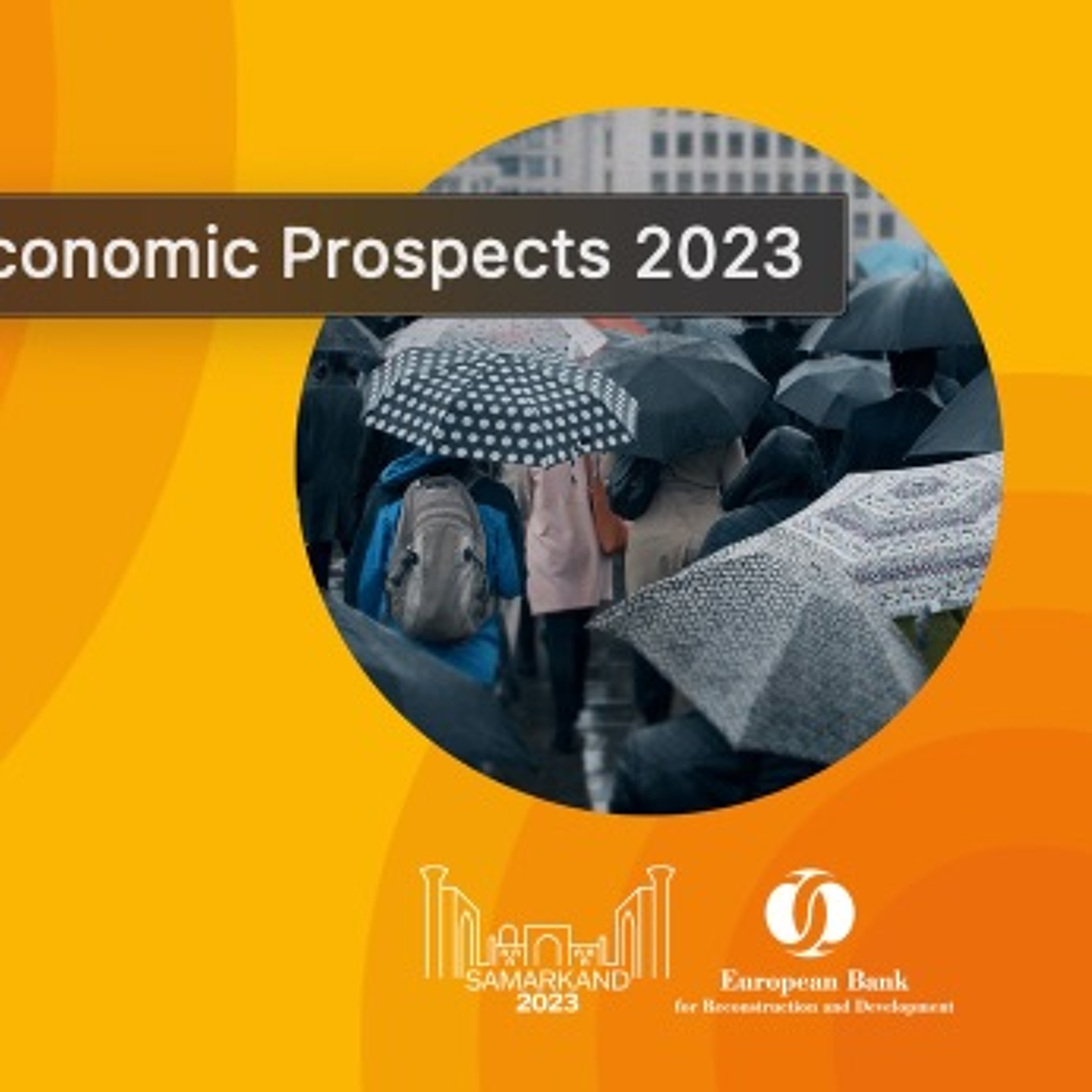 Fearonomics: confront and overcome your fears about the global economyRegional Economic Prospects 2023The much-anticipated EBRD Regional Economic Prospects were back in the new panel discussion format for a special EBRD Annual Meeting 2023 edition. The interactive discussion covered the latest economic forecasts for the regions where the EBRD invests. EBRD Chief Economist Beata Javorcik discussed with outstanding regional experts the extraordinary challenges that policymakers are confronted with in the world of relentless inflationary pressures and repeated economic crises.
Keynote speaker
Beata Javorcik, Chief Economist, EBRD
Moderator
Jonathan Charles, Strategic Communications Consultant and Broadcaster
Speakers
Sergei Guriev, Professor of Economics, Institut d'Études Politiques
Heike Harmgart, Managing Director, Southern and Eastern Mediterranean, EBRD2023-05-2455 min
Fearonomics: confront and overcome your fears about the global economyRegional Economic Prospects 2023The much-anticipated EBRD Regional Economic Prospects were back in the new panel discussion format for a special EBRD Annual Meeting 2023 edition. The interactive discussion covered the latest economic forecasts for the regions where the EBRD invests. EBRD Chief Economist Beata Javorcik discussed with outstanding regional experts the extraordinary challenges that policymakers are confronted with in the world of relentless inflationary pressures and repeated economic crises.
Keynote speaker
Beata Javorcik, Chief Economist, EBRD
Moderator
Jonathan Charles, Strategic Communications Consultant and Broadcaster
Speakers
Sergei Guriev, Professor of Economics, Institut d'Études Politiques
Heike Harmgart, Managing Director, Southern and Eastern Mediterranean, EBRD2023-05-2455 min VoxTalks EconomicsPowerful forces are reshaping global tradeFirms have discovered that global value chains are not as resilient as we assumed. They are reorganising these value chains and re-evaluating their approach to globalisation – but are the solutions they are considering worse than the problems themselves? Tim Phillips talks to Beata Javorcik, EBRD chief economist.2023-03-0315 min
VoxTalks EconomicsPowerful forces are reshaping global tradeFirms have discovered that global value chains are not as resilient as we assumed. They are reorganising these value chains and re-evaluating their approach to globalisation – but are the solutions they are considering worse than the problems themselves? Tim Phillips talks to Beata Javorcik, EBRD chief economist.2023-03-0315 min FearonomicsUkraine Event Special: Sustainable macroeconomic policies for the war and beyondNearly nine months after the Russian invasion, the war has seriously affected Ukraine’s economy, which is facing daunting tasks.
Macroeconomic and financial sector stability are essential for the continued functioning of the economy and maintaining the war effort. Supporting and stimulating the real economy are the key elements of its economic sustainability.
Participants:
Odile Renaud-Basso, President, EBRD
Tymofiy Mylovanov, President, Kyiv School of Economics
Torbjörn Becker, Professor of economics, Stockholm Institute of Transition Economics – SITE and CEPR
Beata Javorcik, Chief Economist, EBRD (moderator)
2022-12-0755 min
FearonomicsUkraine Event Special: Sustainable macroeconomic policies for the war and beyondNearly nine months after the Russian invasion, the war has seriously affected Ukraine’s economy, which is facing daunting tasks.
Macroeconomic and financial sector stability are essential for the continued functioning of the economy and maintaining the war effort. Supporting and stimulating the real economy are the key elements of its economic sustainability.
Participants:
Odile Renaud-Basso, President, EBRD
Tymofiy Mylovanov, President, Kyiv School of Economics
Torbjörn Becker, Professor of economics, Stockholm Institute of Transition Economics – SITE and CEPR
Beata Javorcik, Chief Economist, EBRD (moderator)
2022-12-0755 min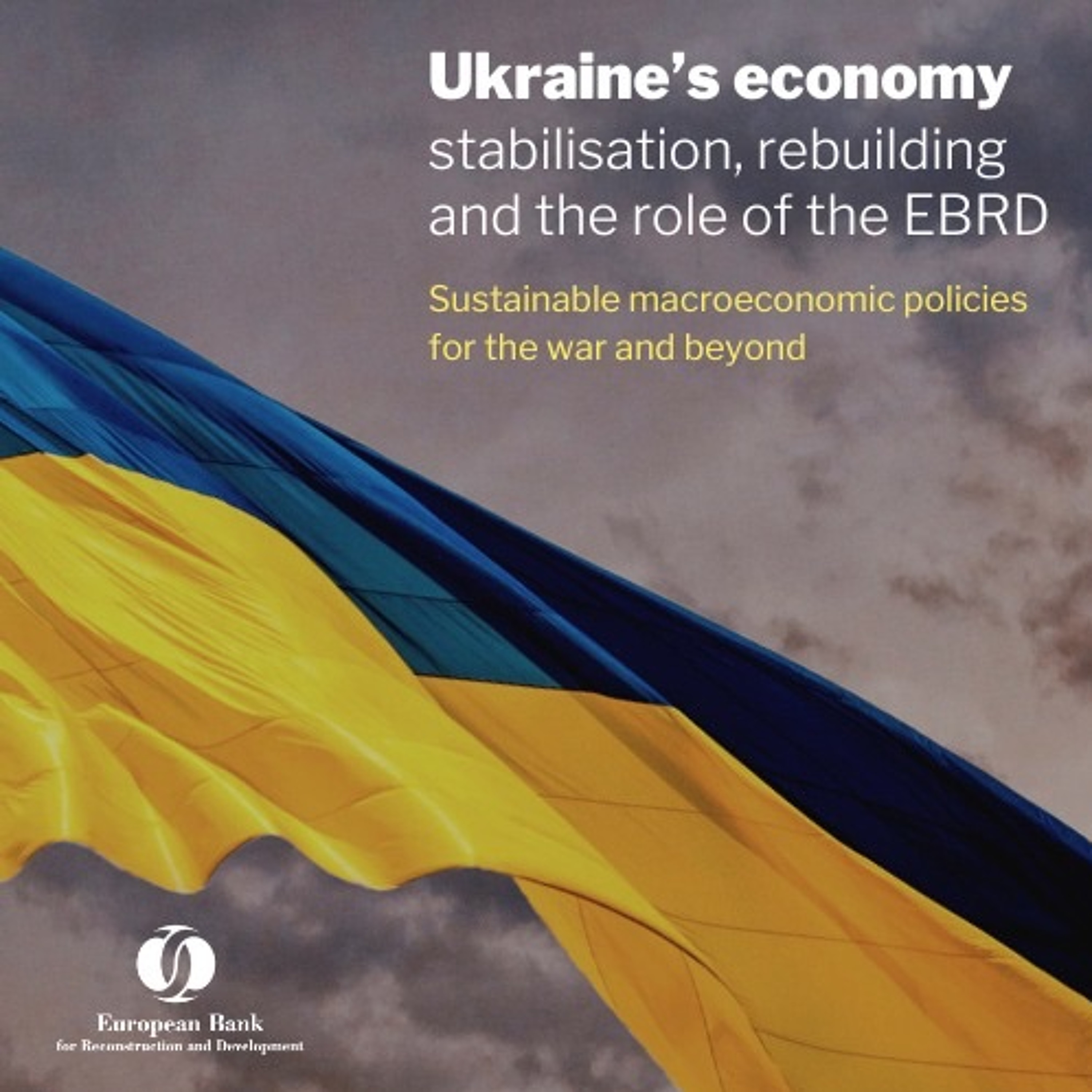 Fearonomics: confront and overcome your fears about the global economyUkraine Event Special: Sustainable macroeconomic policies for the war and beyondNearly nine months after the Russian invasion, the war has seriously affected Ukraine’s economy, which is facing daunting tasks. Macroeconomic and financial sector stability are essential for the continued functioning of the economy and maintaining the war effort. Supporting and stimulating the real economy are the key elements of its economic sustainability.
Participants:
Odile Renaud-Basso, President, EBRD
Tymofiy Mylovanov, President, Kyiv School of Economics
Torbjörn Becker, Professor of economics, Stockholm Institute of Transition Economics – SITE and CEPR
Beata Javorcik, Chief Economist, EBRD (moderator)2022-12-0755 min
Fearonomics: confront and overcome your fears about the global economyUkraine Event Special: Sustainable macroeconomic policies for the war and beyondNearly nine months after the Russian invasion, the war has seriously affected Ukraine’s economy, which is facing daunting tasks. Macroeconomic and financial sector stability are essential for the continued functioning of the economy and maintaining the war effort. Supporting and stimulating the real economy are the key elements of its economic sustainability.
Participants:
Odile Renaud-Basso, President, EBRD
Tymofiy Mylovanov, President, Kyiv School of Economics
Torbjörn Becker, Professor of economics, Stockholm Institute of Transition Economics – SITE and CEPR
Beata Javorcik, Chief Economist, EBRD (moderator)2022-12-0755 min Fearonomics2022-23 EBRD Transition Report launch Business UnusualListen to the live launch of the Transition Report 2022-23: Business Unusual.\
A global pandemic, lockdowns, supply-chain disruption, war in Europe, rocketing gas prices, forced mass migration, high inflation, growing debt burdens, reshoring, friendshoring … This non-exhaustive – yet quite exhausting – list would be enough of a challenge for governments and businesses to manage over a decade or more. And yet, all of this has happened over the past three years, with the prospect of more turbulence to come.
It is clear that there is no going back to the pre-pandemic “business as usual”. Our approach to work has bee...2022-11-241h 19
Fearonomics2022-23 EBRD Transition Report launch Business UnusualListen to the live launch of the Transition Report 2022-23: Business Unusual.\
A global pandemic, lockdowns, supply-chain disruption, war in Europe, rocketing gas prices, forced mass migration, high inflation, growing debt burdens, reshoring, friendshoring … This non-exhaustive – yet quite exhausting – list would be enough of a challenge for governments and businesses to manage over a decade or more. And yet, all of this has happened over the past three years, with the prospect of more turbulence to come.
It is clear that there is no going back to the pre-pandemic “business as usual”. Our approach to work has bee...2022-11-241h 19 AIG Global Trade SeriesWomen and TradeHow does international trade impact on women and gender equality?
Moderator:
Rem Korteweg, Senior Research Fellow, Clingendael Institute
Panellists:
Beata Javorcik, Chief Economist, EBRD
Katrin Kuhlman, Visiting Professor, Georgetown IIEL
This podcast episode was recorded on 7 September 2022
The 2022 edition of the AIG Global Trade Series explores the competition and connectedness that characterise the current trade landscape.
In this podcast, Rem Korteweg (Senior Research Fellow, Clingendael Institute) is joined by Beata Javorcik (Chief Economist, EBRD) and Katrin Kuhlman (Visiting Professor, Georgetown IIEL). Listen as they...2022-10-1347 min
AIG Global Trade SeriesWomen and TradeHow does international trade impact on women and gender equality?
Moderator:
Rem Korteweg, Senior Research Fellow, Clingendael Institute
Panellists:
Beata Javorcik, Chief Economist, EBRD
Katrin Kuhlman, Visiting Professor, Georgetown IIEL
This podcast episode was recorded on 7 September 2022
The 2022 edition of the AIG Global Trade Series explores the competition and connectedness that characterise the current trade landscape.
In this podcast, Rem Korteweg (Senior Research Fellow, Clingendael Institute) is joined by Beata Javorcik (Chief Economist, EBRD) and Katrin Kuhlman (Visiting Professor, Georgetown IIEL). Listen as they...2022-10-1347 min FearonomicsA Cold Winter Ahead? Latest economic forecasts from the EBRDThis special episode in Fearonomics series looks at the economic risks of recent geopolitical turmoil.
Ths live event, where the EBRD launched their economic forecasts, analysed the impact of recent turbulence on the economic outlook, including fallout from Russia’s war on Ukraine, the energy crisis and rising inflation.
Participants:
Beata Javorcik - Chief Economist, EBRD
Sergei Guriev – Professor, Sciences Po Provost
Heike Harmgart – EBRD Managing Director, SEMED
Jonathan Charles (Moderator) - former EBRD Managing Director, Communications
2022-09-2856 min
FearonomicsA Cold Winter Ahead? Latest economic forecasts from the EBRDThis special episode in Fearonomics series looks at the economic risks of recent geopolitical turmoil.
Ths live event, where the EBRD launched their economic forecasts, analysed the impact of recent turbulence on the economic outlook, including fallout from Russia’s war on Ukraine, the energy crisis and rising inflation.
Participants:
Beata Javorcik - Chief Economist, EBRD
Sergei Guriev – Professor, Sciences Po Provost
Heike Harmgart – EBRD Managing Director, SEMED
Jonathan Charles (Moderator) - former EBRD Managing Director, Communications
2022-09-2856 min Fearonomics: confront and overcome your fears about the global economyA Cold Winter Ahead? Latest economic forecasts from the EBRDThis special episode in Fearonomics series looks at the economic risks of recent geopolitical turmoil.
Ths live event, where the EBRD launched their economic forecasts, analysed the impact of recent turbulence on the economic outlook, including fallout from Russia’s war on Ukraine, the energy crisis and rising inflation.
Participants:
Beata Javorcik - Chief Economist, EBRD
Sergei Guriev – Professor, Sciences Po Provost
Heike Harmgart – EBRD Managing Director, SEMED
Jonathan Charles (Moderator) - former EBRD Managing Director, Communications2022-09-2856 min
Fearonomics: confront and overcome your fears about the global economyA Cold Winter Ahead? Latest economic forecasts from the EBRDThis special episode in Fearonomics series looks at the economic risks of recent geopolitical turmoil.
Ths live event, where the EBRD launched their economic forecasts, analysed the impact of recent turbulence on the economic outlook, including fallout from Russia’s war on Ukraine, the energy crisis and rising inflation.
Participants:
Beata Javorcik - Chief Economist, EBRD
Sergei Guriev – Professor, Sciences Po Provost
Heike Harmgart – EBRD Managing Director, SEMED
Jonathan Charles (Moderator) - former EBRD Managing Director, Communications2022-09-2856 min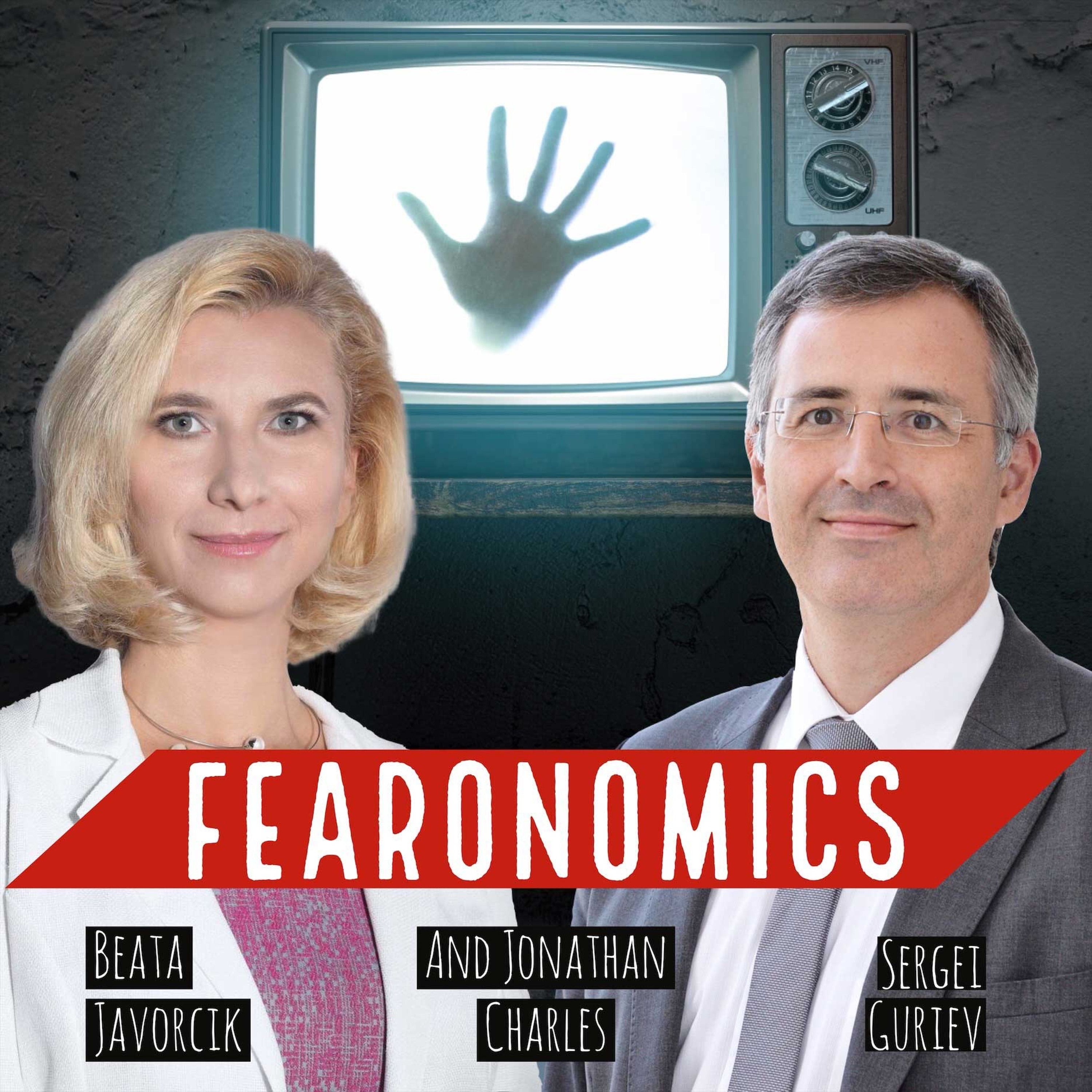 Fearonomics: confront and overcome your fears about the global economyFearonomics: the cost of discriminationRate, review and subscribe to our podcast
At a time when we’re living through the highest inflation in decades, a cost of living crisis and dramatically falling rates of growth, the new Fearonomics episode looks at the cost of discrimination to the global economy.
Despite the recent advancement in the equality of rights and inclusion, 45 per cent of American workers have experienced discrimination in the past year, according to Gallup.
The World Bank’s Women, Business and the Law 2022 report states that around 2.4 billion women of working age lack equal economic opportunities and 178 countries maintain legal barriers that prevent thei...2022-06-2144 min
Fearonomics: confront and overcome your fears about the global economyFearonomics: the cost of discriminationRate, review and subscribe to our podcast
At a time when we’re living through the highest inflation in decades, a cost of living crisis and dramatically falling rates of growth, the new Fearonomics episode looks at the cost of discrimination to the global economy.
Despite the recent advancement in the equality of rights and inclusion, 45 per cent of American workers have experienced discrimination in the past year, according to Gallup.
The World Bank’s Women, Business and the Law 2022 report states that around 2.4 billion women of working age lack equal economic opportunities and 178 countries maintain legal barriers that prevent thei...2022-06-2144 min FearonomicsFearonomics: the cost of discriminationRate, review and subscribe to our podcast
At a time when we’re living through the highest inflation in decades, a cost of living crisis and dramatically falling rates of growth, the new Fearonomics episode looks at the cost of discrimination to the global economy.
Despite the recent advancement in the equality of rights and inclusion, 45 per cent of American workers have experienced discrimination in the past year, according to Gallup.
The World Bank’s Women, Business and the Law 2022 report states that around 2.4 billion women of working age lack equal economic opportunities and...2022-06-2143 min
FearonomicsFearonomics: the cost of discriminationRate, review and subscribe to our podcast
At a time when we’re living through the highest inflation in decades, a cost of living crisis and dramatically falling rates of growth, the new Fearonomics episode looks at the cost of discrimination to the global economy.
Despite the recent advancement in the equality of rights and inclusion, 45 per cent of American workers have experienced discrimination in the past year, according to Gallup.
The World Bank’s Women, Business and the Law 2022 report states that around 2.4 billion women of working age lack equal economic opportunities and...2022-06-2143 min Fearonomics: confront and overcome your fears about the global economyFearonomics: why we fear migrationRate, review and subscribe to our podcast
The new episode of the EBRD’s Fearonomics podcast looks at the most common fears around migration.
The rate of growth of displaced people in the world is alarming. A 100 million is the latest UNHCR estimate -which equals to 1 per cent of the global population.
This stark anti-record reflects the precarious state of the world we are in.
The War on Ukraine, other conflicts, human rights violations, persecutions and violence are behind the unprecedented movement of people.
At the same, as the Covid-19 restrictions are being lifted across the world, the economic migration is...2022-06-1345 min
Fearonomics: confront and overcome your fears about the global economyFearonomics: why we fear migrationRate, review and subscribe to our podcast
The new episode of the EBRD’s Fearonomics podcast looks at the most common fears around migration.
The rate of growth of displaced people in the world is alarming. A 100 million is the latest UNHCR estimate -which equals to 1 per cent of the global population.
This stark anti-record reflects the precarious state of the world we are in.
The War on Ukraine, other conflicts, human rights violations, persecutions and violence are behind the unprecedented movement of people.
At the same, as the Covid-19 restrictions are being lifted across the world, the economic migration is...2022-06-1345 min FearonomicsFearonomics: why we fear migrationRate, review and subscribe to our podcast
The new episode of the EBRD’s Fearonomics podcast looks at the most common fears around migration.
The rate of growth of displaced people in the world is alarming. A 100 million is the latest UNHCR estimate -which equals to 1 per cent of the global population.
This stark anti-record reflects the precarious state of the world we are in.
The War on Ukraine, other conflicts, human rights violations, persecutions and violence are behind the unprecedented movement of people.
At the same, as the Covi...2022-06-1345 min
FearonomicsFearonomics: why we fear migrationRate, review and subscribe to our podcast
The new episode of the EBRD’s Fearonomics podcast looks at the most common fears around migration.
The rate of growth of displaced people in the world is alarming. A 100 million is the latest UNHCR estimate -which equals to 1 per cent of the global population.
This stark anti-record reflects the precarious state of the world we are in.
The War on Ukraine, other conflicts, human rights violations, persecutions and violence are behind the unprecedented movement of people.
At the same, as the Covi...2022-06-1345 min FearonomicsFearonomics: the future pandemics we fearRate, review and subscribe to our podcast
The new episode of the EBRD’s Fearonomics podcast explores the risks of future pandemics.
With new cases of monkeypox globally detected, the looming risks of growing anti-microbial resistance and the impact of climate crisis, is the next pandemic just around the corner?
The IMF has recently forecasted the global cost of the Covid-19 pandemic will rise beyond $12,5 trillion through 2024, fuelled by vast gaps in vaccination rates, widening divergence between rich and poor and disproportionate gender impacts.
But w...2022-05-2040 min
FearonomicsFearonomics: the future pandemics we fearRate, review and subscribe to our podcast
The new episode of the EBRD’s Fearonomics podcast explores the risks of future pandemics.
With new cases of monkeypox globally detected, the looming risks of growing anti-microbial resistance and the impact of climate crisis, is the next pandemic just around the corner?
The IMF has recently forecasted the global cost of the Covid-19 pandemic will rise beyond $12,5 trillion through 2024, fuelled by vast gaps in vaccination rates, widening divergence between rich and poor and disproportionate gender impacts.
But w...2022-05-2040 min Fearonomics: confront and overcome your fears about the global economyFearonomics: the future of pandemicsRate, review and subscribe to our podcast
The new episode of the EBRD’s Fearonomics podcast explores the risks of future pandemics.
With new cases of monkeypox globally detected, the looming risks of growing anti-microbial resistance and the impact of climate crisis, is the next pandemic just around the corner?
The IMF has recently forecasted the global cost of the Covid-19 pandemic will rise beyond $12,5 trillion through 2024, fuelled by vast gaps in vaccination rates, widening divergence between rich and poor and disproportionate gender impacts.
But we have yet to suffer many of the hidden costs of the pandemic.
Such as th...2022-05-2040 min
Fearonomics: confront and overcome your fears about the global economyFearonomics: the future of pandemicsRate, review and subscribe to our podcast
The new episode of the EBRD’s Fearonomics podcast explores the risks of future pandemics.
With new cases of monkeypox globally detected, the looming risks of growing anti-microbial resistance and the impact of climate crisis, is the next pandemic just around the corner?
The IMF has recently forecasted the global cost of the Covid-19 pandemic will rise beyond $12,5 trillion through 2024, fuelled by vast gaps in vaccination rates, widening divergence between rich and poor and disproportionate gender impacts.
But we have yet to suffer many of the hidden costs of the pandemic.
Such as th...2022-05-2040 min FearonomicsFearonomics: why should we fear inflationRate, review, download our podcast
In the new episode of the EBRD’s Fearonomics podcast Jonathan Charles, the EBRD’s Managing Director of Communications, Sergei Guriev, former EBRD Chief Economist and now Professor of Economics at Science Po, and Beata Javorcik, the EBRD’s current Chief Economist, examine the threat to our economies from inflation and whether we risk an era of stagflation.
Policymakers had to step up support for businesses and the population at large when Covid-19 was at its worse. The strain on public budgets was palpable – even before Russia’s war on Ukraine.
...2022-05-0540 min
FearonomicsFearonomics: why should we fear inflationRate, review, download our podcast
In the new episode of the EBRD’s Fearonomics podcast Jonathan Charles, the EBRD’s Managing Director of Communications, Sergei Guriev, former EBRD Chief Economist and now Professor of Economics at Science Po, and Beata Javorcik, the EBRD’s current Chief Economist, examine the threat to our economies from inflation and whether we risk an era of stagflation.
Policymakers had to step up support for businesses and the population at large when Covid-19 was at its worse. The strain on public budgets was palpable – even before Russia’s war on Ukraine.
...2022-05-0540 min Fearonomics: confront and overcome your fears about the global economyFearonomics: why should we fear inflationRate, review, download our podcast
In the new episode of the EBRD’s Fearonomics podcast Jonathan Charles, the EBRD’s Managing Director of Communications, Sergei Guriev, former EBRD Chief Economist and now Professor of Economics at Science Po, and Beata Javorcik, the EBRD’s current Chief Economist, examine the threat to our economies from inflation and whether we risk an era of stagflation.
Policymakers had to step up support for businesses and the population at large when Covid-19 was at its worse. The strain on public budgets was palpable – even before Russia’s war on Ukraine.
The latest IMF forecast sees “war...2022-05-0540 min
Fearonomics: confront and overcome your fears about the global economyFearonomics: why should we fear inflationRate, review, download our podcast
In the new episode of the EBRD’s Fearonomics podcast Jonathan Charles, the EBRD’s Managing Director of Communications, Sergei Guriev, former EBRD Chief Economist and now Professor of Economics at Science Po, and Beata Javorcik, the EBRD’s current Chief Economist, examine the threat to our economies from inflation and whether we risk an era of stagflation.
Policymakers had to step up support for businesses and the population at large when Covid-19 was at its worse. The strain on public budgets was palpable – even before Russia’s war on Ukraine.
The latest IMF forecast sees “war...2022-05-0540 min The Sound of EconomicsWar in Ukraine: What is the effect on Central and Eastern Europe?In this episode of the Sound of Economics Live, Bruegel Director Guntram Wolff hosted Beata Javorcik, Chief Economist of the EBRD, to discuss how the ongoing war in Ukraine is affecting Central and Eastern Europe. Drawing on the EBRD’s recent activity in Ukraine and it’s neighbourhood, Ms Javorcik reflected on the impact of the conflict not just on Ukraine, but also on the EU countries geographically closest to the conflict.
Check our special podcast series, War in Ukraine, which reflect on the implications of Russia's war in Ukraine in EU energy storage, macroeconomic implications, international finance syst...2022-04-2657 min
The Sound of EconomicsWar in Ukraine: What is the effect on Central and Eastern Europe?In this episode of the Sound of Economics Live, Bruegel Director Guntram Wolff hosted Beata Javorcik, Chief Economist of the EBRD, to discuss how the ongoing war in Ukraine is affecting Central and Eastern Europe. Drawing on the EBRD’s recent activity in Ukraine and it’s neighbourhood, Ms Javorcik reflected on the impact of the conflict not just on Ukraine, but also on the EU countries geographically closest to the conflict.
Check our special podcast series, War in Ukraine, which reflect on the implications of Russia's war in Ukraine in EU energy storage, macroeconomic implications, international finance syst...2022-04-2657 min FearonomicsFearonomics: death of globalisationRate, review and subscribe to our podcast
The new episode of the EBRD’s Fearonomics podcast explores the risks of rolling back globalisation.
Globalisation connected the world’s economies as never before. Cross-border trade in goods and services became a routine.
The financial crisis of 15 years ago highlighted how fast contagion can spread around the globe.
The Covid pandemic exposed how fragile supply chains can be. And now Russia’s war on Ukraine suggests that economic links can be a source of weakness, not strength.
Listen to Jonathan Charles, the EBRD’...2022-04-2034 min
FearonomicsFearonomics: death of globalisationRate, review and subscribe to our podcast
The new episode of the EBRD’s Fearonomics podcast explores the risks of rolling back globalisation.
Globalisation connected the world’s economies as never before. Cross-border trade in goods and services became a routine.
The financial crisis of 15 years ago highlighted how fast contagion can spread around the globe.
The Covid pandemic exposed how fragile supply chains can be. And now Russia’s war on Ukraine suggests that economic links can be a source of weakness, not strength.
Listen to Jonathan Charles, the EBRD’...2022-04-2034 min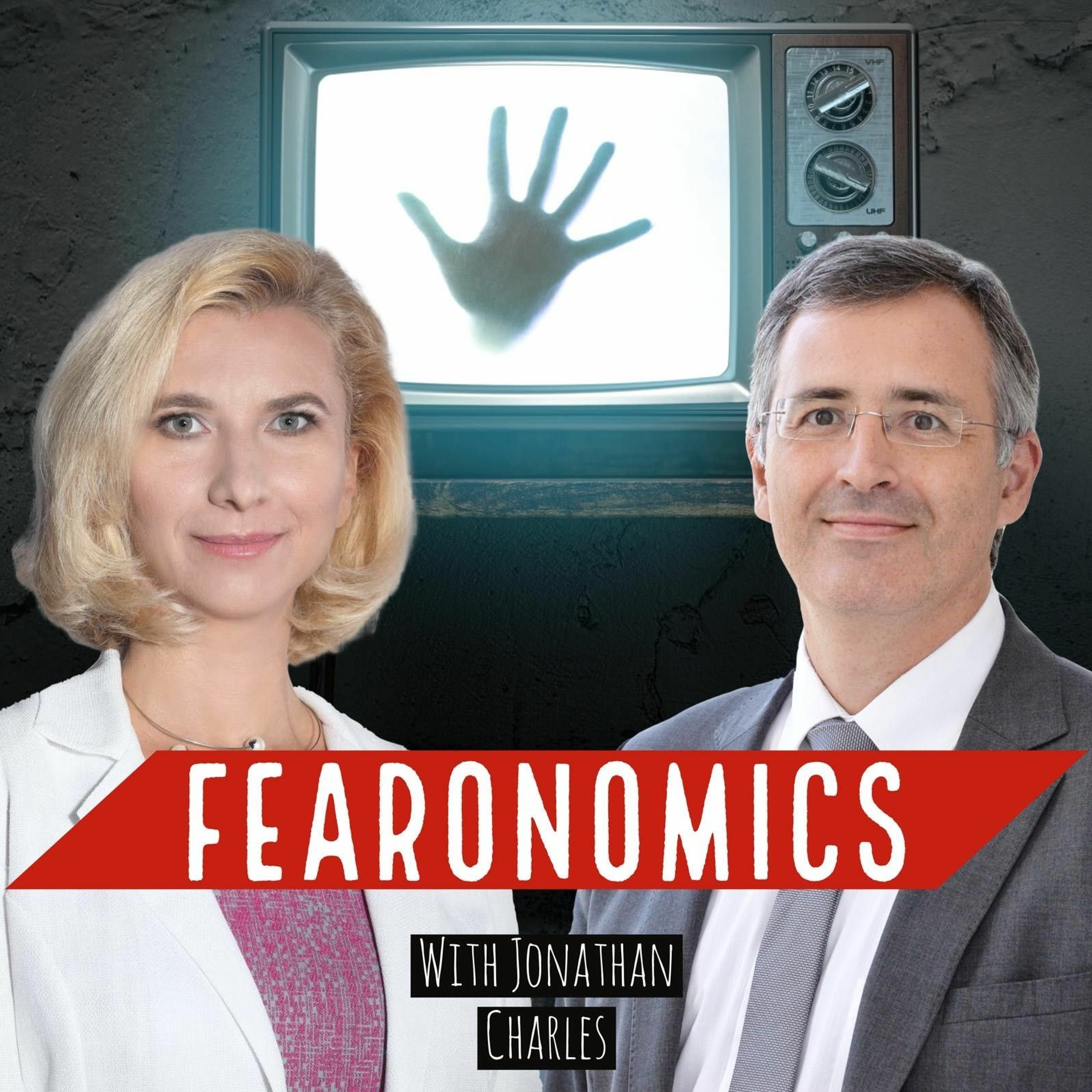 Fearonomics: confront and overcome your fears about the global economyFearonomics: death of globalisation?Rate, review and subscribe to our podcast
The new episode of the EBRD’s Fearonomics podcast explores the risks of rolling back globalisation.
Globalisation connected the world’s economies as never before. Cross-border trade in goods and services became a routine.
The financial crisis of 15 years ago highlighted how fast contagion can spread around the globe.
The Covid pandemic exposed how fragile supply chains can be. And now Russia’s war on Ukraine suggests that economic links can be a source of weakness, not strength.
Listen to Jonathan Charles, the EBRD’s Managing Director of Communications, in discussion with Sergei Guriev...2022-04-2034 min
Fearonomics: confront and overcome your fears about the global economyFearonomics: death of globalisation?Rate, review and subscribe to our podcast
The new episode of the EBRD’s Fearonomics podcast explores the risks of rolling back globalisation.
Globalisation connected the world’s economies as never before. Cross-border trade in goods and services became a routine.
The financial crisis of 15 years ago highlighted how fast contagion can spread around the globe.
The Covid pandemic exposed how fragile supply chains can be. And now Russia’s war on Ukraine suggests that economic links can be a source of weakness, not strength.
Listen to Jonathan Charles, the EBRD’s Managing Director of Communications, in discussion with Sergei Guriev...2022-04-2034 min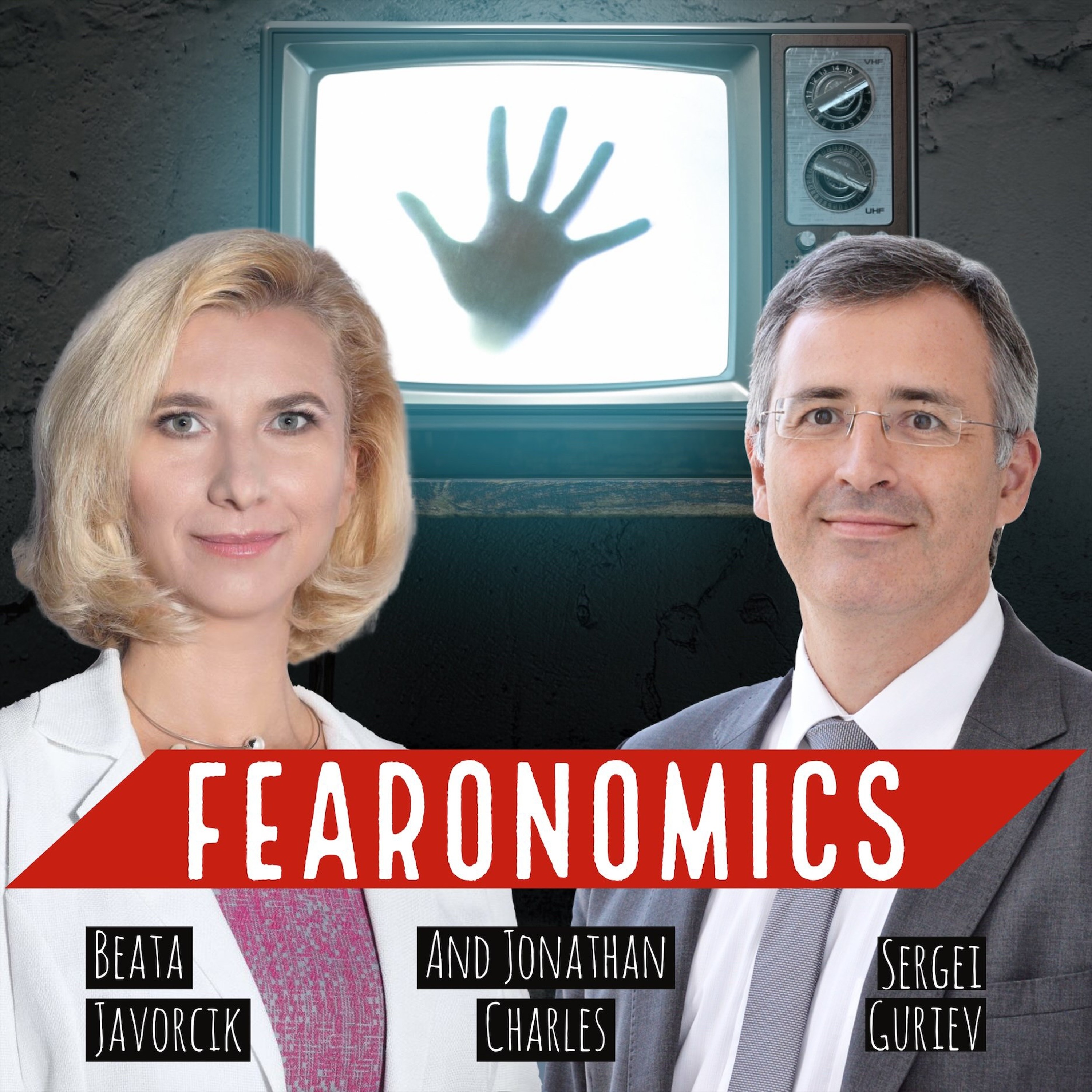 Fearonomics: confront and overcome your fears about the global economyFearonomics: will the global energy crisis end the shift to green?Fearonomics: will global energy crisis end the shift to green?
Rate, review and subscribe to our podcast
In its second episode the EBRD’s new Fearonomics podcast is exploring what are the risks and solutions to the global energy crisis.
Listen to Jonathan Charles, EBRD’s Managing Director, Communications, Sergei Guriev, EBRD former Chief Economist and professor of economics at Science Po and Beata Javorcik, EBRD’s Chief Economist (current) and also professor of Economics at Oxford University discussing
As Europe scrambles to find alternatives to Russian gas, some countries face the prospect of rationing and even fuel poverty.
Energy security, w...2022-04-0738 min
Fearonomics: confront and overcome your fears about the global economyFearonomics: will the global energy crisis end the shift to green?Fearonomics: will global energy crisis end the shift to green?
Rate, review and subscribe to our podcast
In its second episode the EBRD’s new Fearonomics podcast is exploring what are the risks and solutions to the global energy crisis.
Listen to Jonathan Charles, EBRD’s Managing Director, Communications, Sergei Guriev, EBRD former Chief Economist and professor of economics at Science Po and Beata Javorcik, EBRD’s Chief Economist (current) and also professor of Economics at Oxford University discussing
As Europe scrambles to find alternatives to Russian gas, some countries face the prospect of rationing and even fuel poverty.
Energy security, w...2022-04-0738 min FearonomicsFearonomics: will the global energy crisis end the shift to green?Fearonomics: will global energy crisis end the shift to green?
Rate, review and subscribe to our podcast
In its second episode the EBRD’s new Fearonomics podcast is exploring what are the risks and solutions to the global energy crisis.
Listen to Jonathan Charles, EBRD’s Managing Director, Communications, Sergei Guriev, EBRD former Chief Economist and professor of economics at Science Po and Beata Javorcik, EBRD’s Chief Economist (current) and also professor of Economics at Oxford University discussing
As Europe scrambles to find alternatives to Russian gas, some countries face the prospect...2022-04-0738 min
FearonomicsFearonomics: will the global energy crisis end the shift to green?Fearonomics: will global energy crisis end the shift to green?
Rate, review and subscribe to our podcast
In its second episode the EBRD’s new Fearonomics podcast is exploring what are the risks and solutions to the global energy crisis.
Listen to Jonathan Charles, EBRD’s Managing Director, Communications, Sergei Guriev, EBRD former Chief Economist and professor of economics at Science Po and Beata Javorcik, EBRD’s Chief Economist (current) and also professor of Economics at Oxford University discussing
As Europe scrambles to find alternatives to Russian gas, some countries face the prospect...2022-04-0738 min FearonomicsFearonomics: can we fix the looming food crisis?Fearonomics: can we fix the looming food crisis?
EBRD’s new podcast confronts biggest economic fears
Listen to a new EBRD podcast called “Fearonomics”, which aims to help confront – and overcome - fears about the global economy by looking at the latest economic data, debunking myths and defining the risks to watch out for.
Jonathan Charles, EBRD’s Managing Director, Communications, will be discussing the most pressing issues with Sergei Guriev, EBRD former Chief Economist and professor of economics at Science Po and Beata Javorcik, EBRD’s Chief Economist (current) and also...2022-04-0134 min
FearonomicsFearonomics: can we fix the looming food crisis?Fearonomics: can we fix the looming food crisis?
EBRD’s new podcast confronts biggest economic fears
Listen to a new EBRD podcast called “Fearonomics”, which aims to help confront – and overcome - fears about the global economy by looking at the latest economic data, debunking myths and defining the risks to watch out for.
Jonathan Charles, EBRD’s Managing Director, Communications, will be discussing the most pressing issues with Sergei Guriev, EBRD former Chief Economist and professor of economics at Science Po and Beata Javorcik, EBRD’s Chief Economist (current) and also...2022-04-0134 min Fearonomics: confront and overcome your fears about the global economyFearonomics: can we fix the looming food crisis?In its first episode Fearonomics: can we fix the looming food crisis? Jonathan Charles, EBRD’s Managing Director, Communications, will be discussing the most pressing issues with Sergei Guriev, EBRD former Chief Economist and professor of economics at Science Po and Beata Javorcik, EBRD’s Chief Economist (current) and also professor of Economics at Oxford University.
They will explore a wide range of economic fears from global famine to energy security and the death of globalisation.
In its first episode Fearonomics will be exploring whether the looming food crises is avoidable.
Even before the war on Ukraine and the pandemic acco...2022-04-0134 min
Fearonomics: confront and overcome your fears about the global economyFearonomics: can we fix the looming food crisis?In its first episode Fearonomics: can we fix the looming food crisis? Jonathan Charles, EBRD’s Managing Director, Communications, will be discussing the most pressing issues with Sergei Guriev, EBRD former Chief Economist and professor of economics at Science Po and Beata Javorcik, EBRD’s Chief Economist (current) and also professor of Economics at Oxford University.
They will explore a wide range of economic fears from global famine to energy security and the death of globalisation.
In its first episode Fearonomics will be exploring whether the looming food crises is avoidable.
Even before the war on Ukraine and the pandemic acco...2022-04-0134 min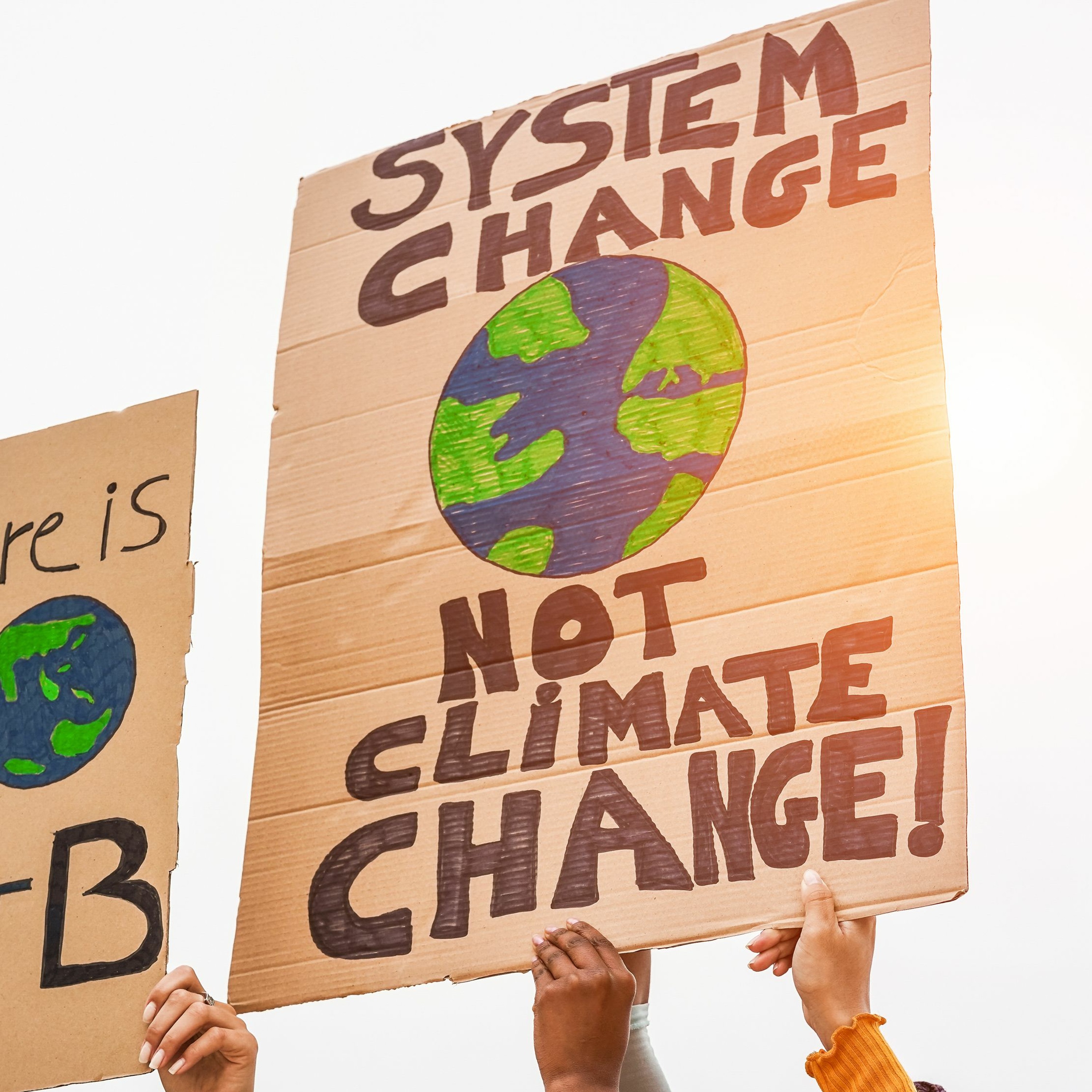 Centre for European ReformCER podcast: Do states need to use more economic coercion to drive climate action?This week’s CER podcast features speakers from our recent economics conference on ‘The politics of climate change’ at Ditchley Park.
Panellists included Suzi Kerr of the Environmental Defence Fund, the European Commission’s Arianna Vanini, Beata Javorcik of the European Bank for Reconstruction and Development and the World Bank’s Stéphane Hallegate, whose remarks we included in the first half of this episode. They spoke about whether we needed tougher measures against laggard countries in the fight against climate change. They also discussed whether carbon border adjustment mechanisms would work, and how developing countries could be brought on board.
In...2022-02-0433 min
Centre for European ReformCER podcast: Do states need to use more economic coercion to drive climate action?This week’s CER podcast features speakers from our recent economics conference on ‘The politics of climate change’ at Ditchley Park.
Panellists included Suzi Kerr of the Environmental Defence Fund, the European Commission’s Arianna Vanini, Beata Javorcik of the European Bank for Reconstruction and Development and the World Bank’s Stéphane Hallegate, whose remarks we included in the first half of this episode. They spoke about whether we needed tougher measures against laggard countries in the fight against climate change. They also discussed whether carbon border adjustment mechanisms would work, and how developing countries could be brought on board.
In...2022-02-0433 min Fearonomics: confront and overcome your fears about the global economyTransition Report 2021-22 launchSystem upgrade: Delivering the digital dividend
Our report explores how advanced digitalisation has affected the economies where we invest.
The digitalisation process is destined to continue and will remain one of the key forces shaping developments around the world – including in the EBRD regions. It is therefore quite fitting that this year’s Transition Report is devoted to that subject. It explores the size of the digital divides in EBRD countries, the digital infrastructure and its link to firm performance, teleworking, artificial intelligence and the labour force as well as fintech and banks in transition. The report also introduces a fina...2021-11-171h 30
Fearonomics: confront and overcome your fears about the global economyTransition Report 2021-22 launchSystem upgrade: Delivering the digital dividend
Our report explores how advanced digitalisation has affected the economies where we invest.
The digitalisation process is destined to continue and will remain one of the key forces shaping developments around the world – including in the EBRD regions. It is therefore quite fitting that this year’s Transition Report is devoted to that subject. It explores the size of the digital divides in EBRD countries, the digital infrastructure and its link to firm performance, teleworking, artificial intelligence and the labour force as well as fintech and banks in transition. The report also introduces a fina...2021-11-171h 30 FearonomicsCOP26: what’s at stake for the EBRD regionsListen, download and rate our podcast
COP26, or the 2021 United Nations Climate Change Conference, will bring international stakeholders together to accelerate action towards the goals of the Paris Agreement and the UN Framework Convention on Climate Change. It takes place next month in Glasgow.
The stake are very high, as the climate emergency, highlighted in the IPCC report from earlier this year, requires urgent and decisive action from the world’s governments.
The climate emergency cannot remain an abstract notion but must become a strong driver of macroeconomic policy if we a...2021-10-081h 26
FearonomicsCOP26: what’s at stake for the EBRD regionsListen, download and rate our podcast
COP26, or the 2021 United Nations Climate Change Conference, will bring international stakeholders together to accelerate action towards the goals of the Paris Agreement and the UN Framework Convention on Climate Change. It takes place next month in Glasgow.
The stake are very high, as the climate emergency, highlighted in the IPCC report from earlier this year, requires urgent and decisive action from the world’s governments.
The climate emergency cannot remain an abstract notion but must become a strong driver of macroeconomic policy if we a...2021-10-081h 26 Fearonomics: confront and overcome your fears about the global economyCOP26: what’s at stake for the EBRD regionsListen, download and rate our podcast
COP26, or the 2021 United Nations Climate Change Conference, will bring international stakeholders together to accelerate action towards the goals of the Paris Agreement and the UN Framework Convention on Climate Change. It takes place next month in Glasgow.
The stake are very high, as the climate emergency, highlighted in the IPCC report from earlier this year, requires urgent and decisive action from the world’s governments.
The climate emergency cannot remain an abstract notion but must become a strong driver of macroeconomic policy if we are to avoid the “hell of earth,” the report conclu...2021-10-081h 26
Fearonomics: confront and overcome your fears about the global economyCOP26: what’s at stake for the EBRD regionsListen, download and rate our podcast
COP26, or the 2021 United Nations Climate Change Conference, will bring international stakeholders together to accelerate action towards the goals of the Paris Agreement and the UN Framework Convention on Climate Change. It takes place next month in Glasgow.
The stake are very high, as the climate emergency, highlighted in the IPCC report from earlier this year, requires urgent and decisive action from the world’s governments.
The climate emergency cannot remain an abstract notion but must become a strong driver of macroeconomic policy if we are to avoid the “hell of earth,” the report conclu...2021-10-081h 26 VoxTalks EconomicsRemembering Peter NearyEarlier in 2021 Peter Neary passed away. This special episode pays tribute to his work and examines why Peter was held in such affection by his colleagues. With contributions from Patrick Honohan, Richard Portes, Monika Mrázová, Beata Javorcik, and Abi Adams-Prassl.2021-09-1017 min
VoxTalks EconomicsRemembering Peter NearyEarlier in 2021 Peter Neary passed away. This special episode pays tribute to his work and examines why Peter was held in such affection by his colleagues. With contributions from Patrick Honohan, Richard Portes, Monika Mrázová, Beata Javorcik, and Abi Adams-Prassl.2021-09-1017 min Druga strona pieniądzaBeata Javorcik: Pandemia umocni rolę państwa w gospodarcePolska ma dużą i zdywersyfikowaną gospodarkę, zyskała na wzroście popytu na rynkach eksportu. W mniejszym stopniu niż inne kraje dotknął ją spadek inwestycji zagranicznych. Bardzo optymistycznie podchodzimy do tego, co się będzie działo w Polsce w ciągu najbliższych dwóch lat – mówi prof. Beata Javorcik, główna ekonomistka Europejskiego Banku Odbudowy i Rozwoju. 2021-06-2940 min
Druga strona pieniądzaBeata Javorcik: Pandemia umocni rolę państwa w gospodarcePolska ma dużą i zdywersyfikowaną gospodarkę, zyskała na wzroście popytu na rynkach eksportu. W mniejszym stopniu niż inne kraje dotknął ją spadek inwestycji zagranicznych. Bardzo optymistycznie podchodzimy do tego, co się będzie działo w Polsce w ciągu najbliższych dwóch lat – mówi prof. Beata Javorcik, główna ekonomistka Europejskiego Banku Odbudowy i Rozwoju. 2021-06-2940 min Fearonomics: confront and overcome your fears about the global economyRobots v Covid-19: the future of work?Robots v Covid-19: the future of work?
Rate, review and download our podcast
“Telecommuting”, “quaranteams”, “doomscrolling”, “upperwear” and curating one’s Zoom background have all become a part of our new remote working reality. If we were unnerved by the way digital technology was transforming our world before the pandemic, Covid-19 has only made the speed of change even faster,
It is estimated that in the next five years close to 85 million jobs may be displaced by algorithms, artificial intelligence and robotics.
According to the World Economic Forum Jobs Report 2020, “automation, in tandem with the COVID-19 recession, is creating a ‘double-disruption’ sce...2021-05-2538 min
Fearonomics: confront and overcome your fears about the global economyRobots v Covid-19: the future of work?Robots v Covid-19: the future of work?
Rate, review and download our podcast
“Telecommuting”, “quaranteams”, “doomscrolling”, “upperwear” and curating one’s Zoom background have all become a part of our new remote working reality. If we were unnerved by the way digital technology was transforming our world before the pandemic, Covid-19 has only made the speed of change even faster,
It is estimated that in the next five years close to 85 million jobs may be displaced by algorithms, artificial intelligence and robotics.
According to the World Economic Forum Jobs Report 2020, “automation, in tandem with the COVID-19 recession, is creating a ‘double-disruption’ sce...2021-05-2538 min FearonomicsRobots v Covid-19: the future of work?Rate, review and download our podcast
“Telecommuting”, “quaranteams”, “doomscrolling”, “upperwear” and curating one’s Zoom background have all become a part of our new remote working reality. If we were unnerved by the way digital technology was transforming our world before the pandemic, Covid-19 has only made the speed of change even faster,
It is estimated that in the next five years close to 85 million jobs may be displaced by algorithms, artificial intelligence and robotics.
According to the World Economic Forum Jobs Report 2020, “automation, in tandem with the COVID-19 recession, is creating a ‘double-disruption’ scenario for workers. Technologica...2021-05-2538 min
FearonomicsRobots v Covid-19: the future of work?Rate, review and download our podcast
“Telecommuting”, “quaranteams”, “doomscrolling”, “upperwear” and curating one’s Zoom background have all become a part of our new remote working reality. If we were unnerved by the way digital technology was transforming our world before the pandemic, Covid-19 has only made the speed of change even faster,
It is estimated that in the next five years close to 85 million jobs may be displaced by algorithms, artificial intelligence and robotics.
According to the World Economic Forum Jobs Report 2020, “automation, in tandem with the COVID-19 recession, is creating a ‘double-disruption’ scenario for workers. Technologica...2021-05-2538 min Fearonomics: confront and overcome your fears about the global economyThe EBRD at 30: what’s next?Rate, review and download our podcast
On the 15 April 1991, the European Bank for Reconstruction and Development opened its doors for business for the first time.
It was conceived by its founders as ‘a new and unique structure of co‑operation’ for a continent still recovering from the shock of the collapse of communism.
Its mission then, as now, was to further progress towards market-oriented economies and promote private and entrepreneurial initiative.
So, at the age of 30, how is the EBRD doing? What are the challenges for its future? What has the EBRD taught some of its former staff?
This special discus...2021-04-161h 25
Fearonomics: confront and overcome your fears about the global economyThe EBRD at 30: what’s next?Rate, review and download our podcast
On the 15 April 1991, the European Bank for Reconstruction and Development opened its doors for business for the first time.
It was conceived by its founders as ‘a new and unique structure of co‑operation’ for a continent still recovering from the shock of the collapse of communism.
Its mission then, as now, was to further progress towards market-oriented economies and promote private and entrepreneurial initiative.
So, at the age of 30, how is the EBRD doing? What are the challenges for its future? What has the EBRD taught some of its former staff?
This special discus...2021-04-161h 25 FearonomicsThe EBRD at 30: what’s next?Rate, review and download our podcast
On the 15April 1991, the European Bank for Reconstruction and Development opened its doors for business for the first time.
It was conceived by its founders as ‘a new and unique structure of co‑operation’ for a continent still recovering from the shock of the collapse of communism.
Its mission then, as now, was to further progress towards market-oriented economies and promote private and entrepreneurial initiative.
So, at the age of 30, how is the EBRD doing? What are the challenges for its future? What has the EBRD t...2021-04-161h 25
FearonomicsThe EBRD at 30: what’s next?Rate, review and download our podcast
On the 15April 1991, the European Bank for Reconstruction and Development opened its doors for business for the first time.
It was conceived by its founders as ‘a new and unique structure of co‑operation’ for a continent still recovering from the shock of the collapse of communism.
Its mission then, as now, was to further progress towards market-oriented economies and promote private and entrepreneurial initiative.
So, at the age of 30, how is the EBRD doing? What are the challenges for its future? What has the EBRD t...2021-04-161h 25 FearonomicsHow to measure impact of multilateral lendingRate, review and download our podcast
The Multilateral development banks were set up after the Second World War to be the original impact investors, fighting poverty, inequality or more currently climate change.
“To demonstrate our impact is crucial at a time where multilateralism is often challenged, when there is a tendency to think that, we are more effective when we work at a country level than at the global level. And I think that the ability to show that and acting in this mutual framework is helpful to deliver some impacts on values because we are...2021-03-051h 25
FearonomicsHow to measure impact of multilateral lendingRate, review and download our podcast
The Multilateral development banks were set up after the Second World War to be the original impact investors, fighting poverty, inequality or more currently climate change.
“To demonstrate our impact is crucial at a time where multilateralism is often challenged, when there is a tendency to think that, we are more effective when we work at a country level than at the global level. And I think that the ability to show that and acting in this mutual framework is helpful to deliver some impacts on values because we are...2021-03-051h 25 Fearonomics: confront and overcome your fears about the global economyHow to measure impact of multilateral lendingRate, review and download our podcast
The Multilateral development banks were set up after the Second World War to be the original impact investors, fighting poverty, inequality or more currently climate change.
“To demonstrate our impact is crucial at a time where multilateralism is often challenged, when there is a tendency to think that, we are more effective when we work at a country level than at the global level. And I think that the ability to show that and acting in this mutual framework is helpful to deliver some impacts on values because we are building on a very go...2021-03-051h 25
Fearonomics: confront and overcome your fears about the global economyHow to measure impact of multilateral lendingRate, review and download our podcast
The Multilateral development banks were set up after the Second World War to be the original impact investors, fighting poverty, inequality or more currently climate change.
“To demonstrate our impact is crucial at a time where multilateralism is often challenged, when there is a tendency to think that, we are more effective when we work at a country level than at the global level. And I think that the ability to show that and acting in this mutual framework is helpful to deliver some impacts on values because we are building on a very go...2021-03-051h 25 FearonomicsCombatting inequality during and after Covid-19Rate, review and download our podcast
Inequality is emerging as the “biggest policy challenge” during and after the Covid-19 pandemic, with the World Bank estimating that extreme global poverty is to rise for the first time in over 20 years.
“The coronavirus pandemic is possibly the first so-called ‘global event’”, said Professor Branko Milanovic in the latest EBRD Economics Talk.
Sir Angus Deaton, Nobel Prize laureate, also took part in the discussion on the nature of inequality and how it will be aggravated by the pandemic.
EBRD Chief Econom...2021-01-221h 28
FearonomicsCombatting inequality during and after Covid-19Rate, review and download our podcast
Inequality is emerging as the “biggest policy challenge” during and after the Covid-19 pandemic, with the World Bank estimating that extreme global poverty is to rise for the first time in over 20 years.
“The coronavirus pandemic is possibly the first so-called ‘global event’”, said Professor Branko Milanovic in the latest EBRD Economics Talk.
Sir Angus Deaton, Nobel Prize laureate, also took part in the discussion on the nature of inequality and how it will be aggravated by the pandemic.
EBRD Chief Econom...2021-01-221h 28 Fearonomics: confront and overcome your fears about the global economyCombatting inequality during and after Covid-19Rate, review and download our podcast
Inequality is emerging as the “biggest policy challenge” during and after the Covid-19 pandemic, with the World Bank estimating that extreme global poverty is to rise for the first time in over 20 years.
“The coronavirus pandemic is possibly the first so-called ‘global event’”, said Professor Branko Milanovic in the latest EBRD Economics Talk.
Sir Angus Deaton, Nobel Prize laureate, also took part in the discussion on the nature of inequality and how it will be aggravated by the pandemic.
EBRD Chief Economist Beata Javorcik sounded the alarm about coronavirus’s impact on emerging markets across the EBR...2021-01-221h 28
Fearonomics: confront and overcome your fears about the global economyCombatting inequality during and after Covid-19Rate, review and download our podcast
Inequality is emerging as the “biggest policy challenge” during and after the Covid-19 pandemic, with the World Bank estimating that extreme global poverty is to rise for the first time in over 20 years.
“The coronavirus pandemic is possibly the first so-called ‘global event’”, said Professor Branko Milanovic in the latest EBRD Economics Talk.
Sir Angus Deaton, Nobel Prize laureate, also took part in the discussion on the nature of inequality and how it will be aggravated by the pandemic.
EBRD Chief Economist Beata Javorcik sounded the alarm about coronavirus’s impact on emerging markets across the EBR...2021-01-221h 28 Centre for European ReformCER podcast: Can the EU bring its neighbouring countries further into its orbit?This week's CER podcast is the final episode in the series from the CER's annual economics conference, usually hosted at Ditchley Park but this year held as a webinar series.
The podcast features event speakers, Sergei Guriev of Sciences Po, Beata Javorcik of the European Bank for Reconstruction and Development, Şebnem Kalemli-Özcan of the University of Maryland and Abebe Aemro Selassie of the International Monetary Fund. They discussed the EU’s relations with its neighbours including Russia, Eastern Europe, Turkey, the Western Balkans and sub-Saharan Africa, identifying common themes, challenges and lessons.
Katherine Pye, the CER's current Clara Marina O'Do...2020-12-1033 min
Centre for European ReformCER podcast: Can the EU bring its neighbouring countries further into its orbit?This week's CER podcast is the final episode in the series from the CER's annual economics conference, usually hosted at Ditchley Park but this year held as a webinar series.
The podcast features event speakers, Sergei Guriev of Sciences Po, Beata Javorcik of the European Bank for Reconstruction and Development, Şebnem Kalemli-Özcan of the University of Maryland and Abebe Aemro Selassie of the International Monetary Fund. They discussed the EU’s relations with its neighbours including Russia, Eastern Europe, Turkey, the Western Balkans and sub-Saharan Africa, identifying common themes, challenges and lessons.
Katherine Pye, the CER's current Clara Marina O'Do...2020-12-1033 min FearonomicsThe State Strikes Back: what is the role of the state post Covid-19?In 2020, the Covid-19 pandemic highlighted the key role of the state amidst managing public health and economic disaster. However, if the role of state is growing, is it actually a good thing? These are just a few of the questions discussed in this special live launch of 2020-21 Transition Report: The State Strike Back.
EBRD's Anthony Williams was join by a great line up of guests:
Mariana Mazzucato is Professor in the Economics of Innovation and Public Value at University College London (UCL) where she is Founding Director of the Institute for Innovation and Public...2020-11-111h 34
FearonomicsThe State Strikes Back: what is the role of the state post Covid-19?In 2020, the Covid-19 pandemic highlighted the key role of the state amidst managing public health and economic disaster. However, if the role of state is growing, is it actually a good thing? These are just a few of the questions discussed in this special live launch of 2020-21 Transition Report: The State Strike Back.
EBRD's Anthony Williams was join by a great line up of guests:
Mariana Mazzucato is Professor in the Economics of Innovation and Public Value at University College London (UCL) where she is Founding Director of the Institute for Innovation and Public...2020-11-111h 34 Fearonomics: confront and overcome your fears about the global economyThe State Strikes Back: what is the role of the state post Covid-19?In 2020, the Covid-19 pandemic highlighted the key role of the state amidst managing public health and economic disaster. However, if the role of state is growing, is it actually a good thing? These are just a few of the questions discussed in this special live launch of 2020-21 Transition Report: The State Strike Back.
EBRD's Anthony Williams was join by a great line up of guests:
Mariana Mazzucato is Professor in the Economics of Innovation and Public Value at University College London (UCL) where she is Founding Director of the Institute for Innovation and Public Purpose (IIPP).
Dani Rodrik is...2020-11-111h 34
Fearonomics: confront and overcome your fears about the global economyThe State Strikes Back: what is the role of the state post Covid-19?In 2020, the Covid-19 pandemic highlighted the key role of the state amidst managing public health and economic disaster. However, if the role of state is growing, is it actually a good thing? These are just a few of the questions discussed in this special live launch of 2020-21 Transition Report: The State Strike Back.
EBRD's Anthony Williams was join by a great line up of guests:
Mariana Mazzucato is Professor in the Economics of Innovation and Public Value at University College London (UCL) where she is Founding Director of the Institute for Innovation and Public Purpose (IIPP).
Dani Rodrik is...2020-11-111h 34 Oxford Martin School: Public Lectures and SeminarsGlobalisation in the post-COVID worldProfessor Beata Javorcik, Chief Economist at the European Bank for Reconstruction and Development, discusses the recent developments in international trade and the link between trade finance and resilience of trade flows ready for a post-COVID world2020-11-0655 min
Oxford Martin School: Public Lectures and SeminarsGlobalisation in the post-COVID worldProfessor Beata Javorcik, Chief Economist at the European Bank for Reconstruction and Development, discusses the recent developments in international trade and the link between trade finance and resilience of trade flows ready for a post-COVID world2020-11-0655 min Oxford Martin School: Public Lectures and SeminarsGlobalisation in the post-COVID worldProfessor Beata Javorcik, Chief Economist at the European Bank for Reconstruction and Development, discusses the recent developments in international trade and the link between trade finance and resilience of trade flows ready for a post-COVID world2020-11-0655 min
Oxford Martin School: Public Lectures and SeminarsGlobalisation in the post-COVID worldProfessor Beata Javorcik, Chief Economist at the European Bank for Reconstruction and Development, discusses the recent developments in international trade and the link between trade finance and resilience of trade flows ready for a post-COVID world2020-11-0655 min FearonomicsThe growing mountain of debt: how Covid-19 is creating a big pile of debt and what to do with itRate, review and download our podcast
It’s been almost a year since reports of a new strain of coronavirus first emerged. Even back then the IMF was sounding the alarm about the high and rising levels of debt in developing economies.
Today, after lockdowns and severe economic contractions, debt is growing almost as fast as the coronavirus pandemic is spreading.
“It’s not the moment to be timid on debt crisis resolution,’ says the World Bank’s Chief Economist, Carmen Reinhart.
“Proposals need to be bold...2020-10-291h 26
FearonomicsThe growing mountain of debt: how Covid-19 is creating a big pile of debt and what to do with itRate, review and download our podcast
It’s been almost a year since reports of a new strain of coronavirus first emerged. Even back then the IMF was sounding the alarm about the high and rising levels of debt in developing economies.
Today, after lockdowns and severe economic contractions, debt is growing almost as fast as the coronavirus pandemic is spreading.
“It’s not the moment to be timid on debt crisis resolution,’ says the World Bank’s Chief Economist, Carmen Reinhart.
“Proposals need to be bold...2020-10-291h 26 Fearonomics: confront and overcome your fears about the global economyThe growing mountain of debt: how Covid-19 is creating a big pile of debt and what to do with itRate, review and download our podcast
It’s been almost a year since reports of a new strain of coronavirus first emerged. Even back then the IMF was sounding the alarm about the high and rising levels of debt in developing economies.
Today, after lockdowns and severe economic contractions, debt is growing almost as fast as the coronavirus pandemic is spreading.
“It’s not the moment to be timid on debt crisis resolution,’ says the World Bank’s Chief Economist, Carmen Reinhart.
“Proposals need to be bold in terms of delivering debt reduction for the debtors. Because, if not, … risks of the lost de...2020-10-291h 26
Fearonomics: confront and overcome your fears about the global economyThe growing mountain of debt: how Covid-19 is creating a big pile of debt and what to do with itRate, review and download our podcast
It’s been almost a year since reports of a new strain of coronavirus first emerged. Even back then the IMF was sounding the alarm about the high and rising levels of debt in developing economies.
Today, after lockdowns and severe economic contractions, debt is growing almost as fast as the coronavirus pandemic is spreading.
“It’s not the moment to be timid on debt crisis resolution,’ says the World Bank’s Chief Economist, Carmen Reinhart.
“Proposals need to be bold in terms of delivering debt reduction for the debtors. Because, if not, … risks of the lost de...2020-10-291h 26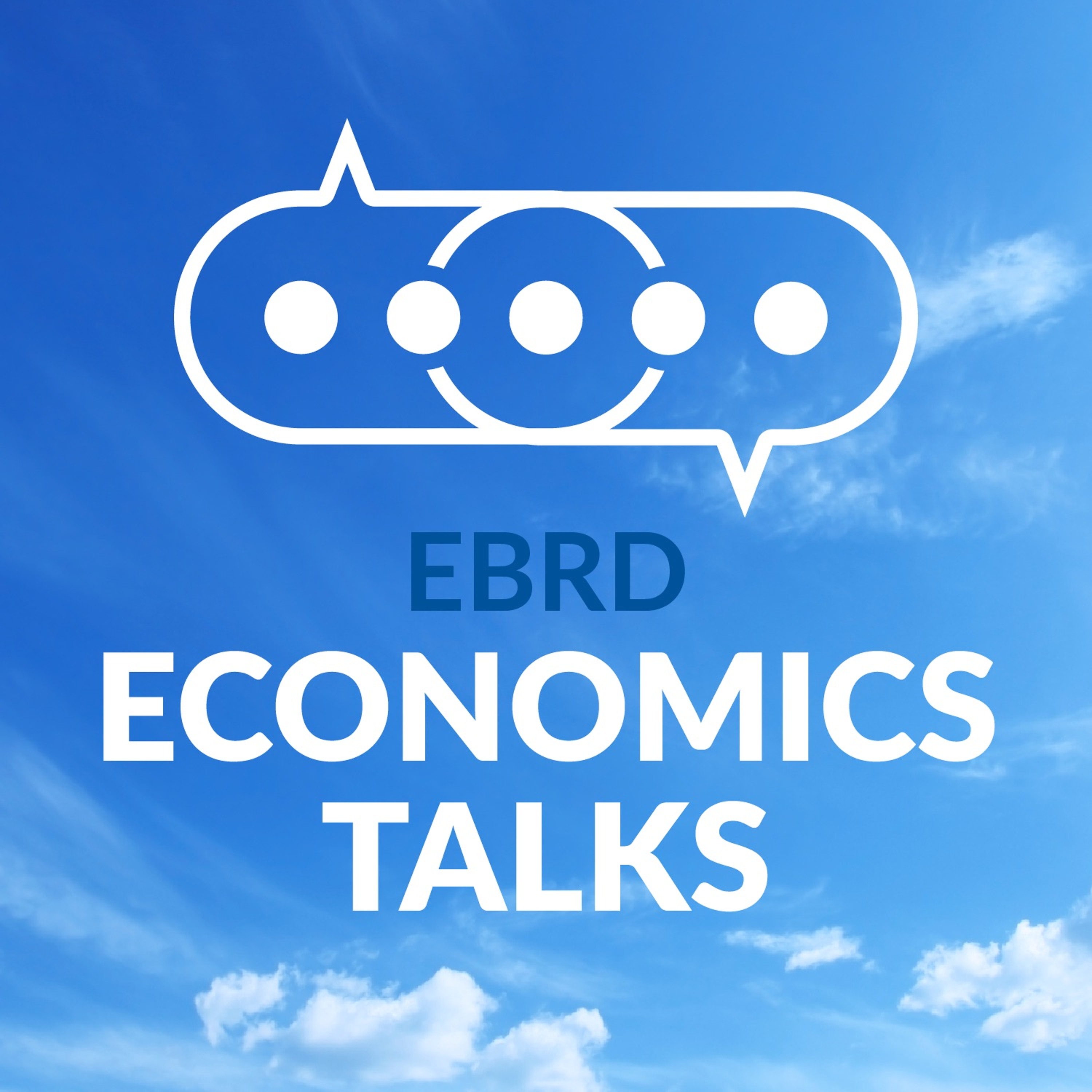 Fearonomics: confront and overcome your fears about the global economyTrade finance during the coronavirus pandemicRate, review and download our podcast
The coronavirus pandemic has broken supply chains, closed off borders and disrupted international trade routes.
Trade, which in recent years accounted for 54% to 60% of global economic activity, is now set to have a drop in global trade flows by 13% to 32%, according to the World Trade Organisation.
Trade is essential for saving lives and livelihoods in times of crisis, as seen with shortages of personal protective equipment, medical supplies and food... This crisis has exposed how vulnerable these connections really are.
What lessons have we learned and how can we reenergise world trade in order...2020-09-181h 21
Fearonomics: confront and overcome your fears about the global economyTrade finance during the coronavirus pandemicRate, review and download our podcast
The coronavirus pandemic has broken supply chains, closed off borders and disrupted international trade routes.
Trade, which in recent years accounted for 54% to 60% of global economic activity, is now set to have a drop in global trade flows by 13% to 32%, according to the World Trade Organisation.
Trade is essential for saving lives and livelihoods in times of crisis, as seen with shortages of personal protective equipment, medical supplies and food... This crisis has exposed how vulnerable these connections really are.
What lessons have we learned and how can we reenergise world trade in order...2020-09-181h 21 FearonomicsFiscal policy and the post Covid-19 social contractRate, review and download our podcast
The full cost of the coronavirus pandemic is still unknown. But state spending has skyrocketed as governments try to protect whole sectors and industries which were put into induced comas this spring.
How will we pay our debts incurred during this crisis? What will be the price of recovery?
In this coronavirus special, EBRD Managing Director of Communications, Jonathan Charles and EBRD Chief Economist Beata Javorcik were joined by:
Willem H. Buiter, the former Citibank Chief Economist and Member of the Monetary Policy committee of t...2020-07-101h 25
FearonomicsFiscal policy and the post Covid-19 social contractRate, review and download our podcast
The full cost of the coronavirus pandemic is still unknown. But state spending has skyrocketed as governments try to protect whole sectors and industries which were put into induced comas this spring.
How will we pay our debts incurred during this crisis? What will be the price of recovery?
In this coronavirus special, EBRD Managing Director of Communications, Jonathan Charles and EBRD Chief Economist Beata Javorcik were joined by:
Willem H. Buiter, the former Citibank Chief Economist and Member of the Monetary Policy committee of t...2020-07-101h 25 Fearonomics: confront and overcome your fears about the global economyFiscal policy and the post Covid-19 social contractRate, review and download our podcast
The full cost of the coronavirus pandemic is still unknown. But state spending has skyrocketed as governments try to protect whole sectors and industries which were put into induced comas this spring.
How will we pay our debts incurred during this crisis? What will be the price of recovery?
In this coronavirus special, EBRD Managing Director of Communications, Jonathan Charles and EBRD Chief Economist Beata Javorcik were joined by:
Willem H. Buiter, the former Citibank Chief Economist and Member of the Monetary Policy committee of the Bank of England (and former EBRD Chief Economist...2020-07-101h 25
Fearonomics: confront and overcome your fears about the global economyFiscal policy and the post Covid-19 social contractRate, review and download our podcast
The full cost of the coronavirus pandemic is still unknown. But state spending has skyrocketed as governments try to protect whole sectors and industries which were put into induced comas this spring.
How will we pay our debts incurred during this crisis? What will be the price of recovery?
In this coronavirus special, EBRD Managing Director of Communications, Jonathan Charles and EBRD Chief Economist Beata Javorcik were joined by:
Willem H. Buiter, the former Citibank Chief Economist and Member of the Monetary Policy committee of the Bank of England (and former EBRD Chief Economist...2020-07-101h 25 Fearonomics: confront and overcome your fears about the global economyWill capitalism survive the coronavirus pandemic?Rate and review our Coronavirus and Capitalism special podcast episode
Joseph Stiglitz, Economist and Professor, Columbia University, Beata Javorcik, EBRD Chief Economist, and Roger Cohen, the Athens Democracy Forum Host and Advisory Board member and New York Times Op-Ed columnist, discussed how and whether capitalism will survive the coronavirus pandemic.
In only a few months, the coronavirus pandemic has seriously shifted the balance of power between the state and the private sector. How is this impacting our politics and economies?
This Pocket Dilemmas podcast special on capitalism in the post-Covid-19 era was organised by the EBRD and the Athens Democracy...2020-06-081h 11
Fearonomics: confront and overcome your fears about the global economyWill capitalism survive the coronavirus pandemic?Rate and review our Coronavirus and Capitalism special podcast episode
Joseph Stiglitz, Economist and Professor, Columbia University, Beata Javorcik, EBRD Chief Economist, and Roger Cohen, the Athens Democracy Forum Host and Advisory Board member and New York Times Op-Ed columnist, discussed how and whether capitalism will survive the coronavirus pandemic.
In only a few months, the coronavirus pandemic has seriously shifted the balance of power between the state and the private sector. How is this impacting our politics and economies?
This Pocket Dilemmas podcast special on capitalism in the post-Covid-19 era was organised by the EBRD and the Athens Democracy...2020-06-081h 11 FearonomicsWill capitalism survive the coronavirus pandemic?Rate and review our Coronavirus and Capitalism special podcast episode
In only a few months, the coronavirus pandemic has seriously shifted the balance of power between the state and the private sector. How is this impacting our politics and economies?
This Pocket Dilemmas podcast special on capitalism in the post-Covid-19 era was organised by the EBRD and the Athens Democracy Forum (in association with The New York Times).
Joseph Stiglitz, Economist and Professor, Columbia University, Beata Javorcik, EBRD Chief Economist, and Roger Cohen, the Athens Democracy Forum Host and Advisory Board member and New Yo...2020-06-081h 11
FearonomicsWill capitalism survive the coronavirus pandemic?Rate and review our Coronavirus and Capitalism special podcast episode
In only a few months, the coronavirus pandemic has seriously shifted the balance of power between the state and the private sector. How is this impacting our politics and economies?
This Pocket Dilemmas podcast special on capitalism in the post-Covid-19 era was organised by the EBRD and the Athens Democracy Forum (in association with The New York Times).
Joseph Stiglitz, Economist and Professor, Columbia University, Beata Javorcik, EBRD Chief Economist, and Roger Cohen, the Athens Democracy Forum Host and Advisory Board member and New Yo...2020-06-081h 11 FearonomicsThe future of capitalism post Covid-19 crisisWill the coronavirus pandemic change capitalism forever? Could such changes lead to economies and societies which are more cohesive, inclusive and fairer than those of the recent past?
In this coronavirus special, EBRD Managing Director of Communications, Jonathan Charles and EBRD Chief Economist Beata Javorcik were joined by:
Sir Paul Collier, Professor of Economics and Public Policy at the Blavatnik School of Government and a Professorial Fellow of St Antony’s College, University of Oxford. His latest book is “The Future of Capitalism: Facing The New Anxieties” (2018).
Colin Mayer CBE, Peter Moores Professor of Manageme...2020-05-191h 23
FearonomicsThe future of capitalism post Covid-19 crisisWill the coronavirus pandemic change capitalism forever? Could such changes lead to economies and societies which are more cohesive, inclusive and fairer than those of the recent past?
In this coronavirus special, EBRD Managing Director of Communications, Jonathan Charles and EBRD Chief Economist Beata Javorcik were joined by:
Sir Paul Collier, Professor of Economics and Public Policy at the Blavatnik School of Government and a Professorial Fellow of St Antony’s College, University of Oxford. His latest book is “The Future of Capitalism: Facing The New Anxieties” (2018).
Colin Mayer CBE, Peter Moores Professor of Manageme...2020-05-191h 23 Fearonomics: confront and overcome your fears about the global economyThe future of capitalism post-coronavirusRate, review and download our podcast
Will the coronavirus pandemic change capitalism forever? Could such changes lead to economies and societies which are more cohesive, inclusive and fairer than those of the recent past?
In this coronavirus special, EBRD Managing Director of Communications, Jonathan Charles and EBRD Chief Economist Beata Javorcik were joined by:
Sir Paul Collier, Professor of Economics and Public Policy at the Blavatnik School of Government and a Professorial Fellow of St Antony’s College, University of Oxford. His latest book is “The Future of Capitalism: Facing The New Anxieties” (2018).
Colin Mayer CBE, Peter Moores Professor of Manage...2020-05-191h 23
Fearonomics: confront and overcome your fears about the global economyThe future of capitalism post-coronavirusRate, review and download our podcast
Will the coronavirus pandemic change capitalism forever? Could such changes lead to economies and societies which are more cohesive, inclusive and fairer than those of the recent past?
In this coronavirus special, EBRD Managing Director of Communications, Jonathan Charles and EBRD Chief Economist Beata Javorcik were joined by:
Sir Paul Collier, Professor of Economics and Public Policy at the Blavatnik School of Government and a Professorial Fellow of St Antony’s College, University of Oxford. His latest book is “The Future of Capitalism: Facing The New Anxieties” (2018).
Colin Mayer CBE, Peter Moores Professor of Manage...2020-05-191h 23 FearonomicsThe Coronavirus pandemic and the future: a conversation with Ivan KrastevRate and review our Coronavirus special podcast episode
The coronavirus pandemic has already turned global politics and economics upside down. Are there lessons to be learnt from previous crises? What will happen to the nation state and how will Covid-19 impact the European project? What happens when millions of people are forced to stay at home and have time to imagine a world run differently than in the past?
In this Coronavirus special live event join us for a preview of Ivan Krastev’s new book on the coronavirus pandemic and its i...2020-05-061h 12
FearonomicsThe Coronavirus pandemic and the future: a conversation with Ivan KrastevRate and review our Coronavirus special podcast episode
The coronavirus pandemic has already turned global politics and economics upside down. Are there lessons to be learnt from previous crises? What will happen to the nation state and how will Covid-19 impact the European project? What happens when millions of people are forced to stay at home and have time to imagine a world run differently than in the past?
In this Coronavirus special live event join us for a preview of Ivan Krastev’s new book on the coronavirus pandemic and its i...2020-05-061h 12 Fearonomics: confront and overcome your fears about the global economyThe Coronavirus pandemic and the future: a conversation with Ivan KrastevRate and review our Coronavirus special podcast episode
The coronavirus pandemic has already turned global politics and economics upside down. Are there lessons to be learnt from previous crises? What will happen to the nation state and how will Covid-19 impact the European project? What happens when millions of people are forced to stay at home and have time to imagine a world run differently than in the past?
In this Coronavirus special live event join us for a preview of Ivan Krastev’s new book on the coronavirus pandemic and its implications for Europe. He was also joined by EB...2020-05-061h 12
Fearonomics: confront and overcome your fears about the global economyThe Coronavirus pandemic and the future: a conversation with Ivan KrastevRate and review our Coronavirus special podcast episode
The coronavirus pandemic has already turned global politics and economics upside down. Are there lessons to be learnt from previous crises? What will happen to the nation state and how will Covid-19 impact the European project? What happens when millions of people are forced to stay at home and have time to imagine a world run differently than in the past?
In this Coronavirus special live event join us for a preview of Ivan Krastev’s new book on the coronavirus pandemic and its implications for Europe. He was also joined by EB...2020-05-061h 12 Fearonomics: confront and overcome your fears about the global economyHow will the coronavirus pandemic affect the global economy?Rate and review EBRD/ LSE IGA joint podcast
The economic and political impact of the coronavirus pandemic is growing more dramatic by the day. Millions of businesses and the jobs they support are under threat. Civil liberties in many countries are being drastically curtailed as governments fight to control the spread of Covid-19.
How will all this change the world economy and what does it mean for globalisation as we know it?
In this Coronavirus special live event, jointly produced with the Institute for Global Affairs at the LSE, our Pocket Dilemmas host, Jonathan Charles is joined by EBRD Chief...2020-04-171h 21
Fearonomics: confront and overcome your fears about the global economyHow will the coronavirus pandemic affect the global economy?Rate and review EBRD/ LSE IGA joint podcast
The economic and political impact of the coronavirus pandemic is growing more dramatic by the day. Millions of businesses and the jobs they support are under threat. Civil liberties in many countries are being drastically curtailed as governments fight to control the spread of Covid-19.
How will all this change the world economy and what does it mean for globalisation as we know it?
In this Coronavirus special live event, jointly produced with the Institute for Global Affairs at the LSE, our Pocket Dilemmas host, Jonathan Charles is joined by EBRD Chief...2020-04-171h 21 FearonomicsHow will the coronavirus pandemic affect the global economy?Rate and review ERD/LSE IGA joint podcast
The economic and political impact of the coronavirus pandemic is growing more dramatic by the day. Millions of businesses and the jobs they support are under threat. Civil liberties in many countries are being drastically curtailed as governments fight to control the spread of Covid-19.
How will all this change the world economy and what does it mean for globalisation as we know it?
In this Coronavirus special live event, jointly produced with the Institute for Global Affairs at the LSE, our Pocket Dilemmas host, Jonathan Charles is joined by EBRD Chief Eco...2020-04-171h 21
FearonomicsHow will the coronavirus pandemic affect the global economy?Rate and review ERD/LSE IGA joint podcast
The economic and political impact of the coronavirus pandemic is growing more dramatic by the day. Millions of businesses and the jobs they support are under threat. Civil liberties in many countries are being drastically curtailed as governments fight to control the spread of Covid-19.
How will all this change the world economy and what does it mean for globalisation as we know it?
In this Coronavirus special live event, jointly produced with the Institute for Global Affairs at the LSE, our Pocket Dilemmas host, Jonathan Charles is joined by EBRD Chief Eco...2020-04-171h 21 FearonomicsCan open borders survive the coronavirus pandemic?Rate, review and subscribe to our podcast Pocket Dilemmas
More and more countries have responded to the coronavirus pandemic by closing themselves off from the rest of the world and shutting their borders, either partially or altogether. Even the European Union’s Schengen zone has reintroduced border checks.
Our presenters, Jonathan Charles and Kerrie Law, were joined on Zoom by our Chief Economist, Beata Javorcik, and the Associate Director of the Centre for Global Development, Helen Dempster, to discuss the future of open borders and freedom of movement across them. What happ...2020-04-1539 min
FearonomicsCan open borders survive the coronavirus pandemic?Rate, review and subscribe to our podcast Pocket Dilemmas
More and more countries have responded to the coronavirus pandemic by closing themselves off from the rest of the world and shutting their borders, either partially or altogether. Even the European Union’s Schengen zone has reintroduced border checks.
Our presenters, Jonathan Charles and Kerrie Law, were joined on Zoom by our Chief Economist, Beata Javorcik, and the Associate Director of the Centre for Global Development, Helen Dempster, to discuss the future of open borders and freedom of movement across them. What happ...2020-04-1539 min Trade Talks124. Is Trade Bad for Women?Does globalization contribute to the gender wage gap? Beata Javorcik joins to explain one overlooked channel.2020-03-0500 min
Trade Talks124. Is Trade Bad for Women?Does globalization contribute to the gender wage gap? Beata Javorcik joins to explain one overlooked channel.2020-03-0500 min Trade Talks124. Is Trade Bad for Women?Does globalization contribute to the gender wage gap? Beata Javorcik joins to explain one overlooked channel.2020-03-0500 min
Trade Talks124. Is Trade Bad for Women?Does globalization contribute to the gender wage gap? Beata Javorcik joins to explain one overlooked channel.2020-03-0500 min Trade Talks124. Is Trade Bad for Women?Does globalization contribute to the gender wage gap? Beata Javorcik joins to explain one overlooked channel.2020-03-0521 min
Trade Talks124. Is Trade Bad for Women?Does globalization contribute to the gender wage gap? Beata Javorcik joins to explain one overlooked channel.2020-03-0521 min Trade Talks124. Is Trade Bad for Women?Does globalization contribute to the gender wage gap? Beata Javorcik joins to explain one overlooked channel.2020-03-0521 min
Trade Talks124. Is Trade Bad for Women?Does globalization contribute to the gender wage gap? Beata Javorcik joins to explain one overlooked channel.2020-03-0521 min Trade Talks124. Is Trade Bad for Women?Does globalization contribute to the gender wage gap? Beata Javorcik joins to explain one overlooked channel.2020-03-0500 min
Trade Talks124. Is Trade Bad for Women?Does globalization contribute to the gender wage gap? Beata Javorcik joins to explain one overlooked channel.2020-03-0500 min Trade Talks124. Is Trade Bad for Women?Does globalization contribute to the gender wage gap? Beata Javorcik (Oxford University, EBRD) joins to explain one overlooked channel. She describes how job flexibility demands for companies that interact in foreign markets across multiple time zones penalize women. With evidence from Norway, they also discuss whether this is driven by perceptions in gender differences that might be overcome by policy change.
Read more...
Esther Ann Bøler, Beata Javorcik, Karen-Helene Ulltveit-Moe. 2018. "Working across Time Zones: Exporters and the Gender Wage Gap," Journal of International Economics. Esther Ann Bøler, Beata Javorcik, Karen-Helene Ulltveit-Moe. 2015. ""Globalisation: A woman's be...2020-03-0500 min
Trade Talks124. Is Trade Bad for Women?Does globalization contribute to the gender wage gap? Beata Javorcik (Oxford University, EBRD) joins to explain one overlooked channel. She describes how job flexibility demands for companies that interact in foreign markets across multiple time zones penalize women. With evidence from Norway, they also discuss whether this is driven by perceptions in gender differences that might be overcome by policy change.
Read more...
Esther Ann Bøler, Beata Javorcik, Karen-Helene Ulltveit-Moe. 2018. "Working across Time Zones: Exporters and the Gender Wage Gap," Journal of International Economics. Esther Ann Bøler, Beata Javorcik, Karen-Helene Ulltveit-Moe. 2015. ""Globalisation: A woman's be...2020-03-0500 min Trade Talks124. Is Trade Bad for Women?Does globalization contribute to the gender wage gap? Beata Javorcik joins to explain one overlooked channel.2020-03-0500 min
Trade Talks124. Is Trade Bad for Women?Does globalization contribute to the gender wage gap? Beata Javorcik joins to explain one overlooked channel.2020-03-0500 min FearonomicsWhat happened to the hopes and dreams of 1989?Rate, review and subscribe to our podcast Pocket Dilemmas
Join Jonathan Charles and Kerry Law on a journey to the region which breached the Berlin Wall and tore down the Iron Curtain in 1989.
Where are the peoples of Germany, Central and Eastern Europe and the former Soviet Union three decades on? we ask in this very special episode of our Pocket Dilemmas podcast.
How far have their dreams of freedoms and prosperity been realised?
And what is the future for market economics, democracy and political pluralism in these EBRD regions?
Our s...2019-11-0745 min
FearonomicsWhat happened to the hopes and dreams of 1989?Rate, review and subscribe to our podcast Pocket Dilemmas
Join Jonathan Charles and Kerry Law on a journey to the region which breached the Berlin Wall and tore down the Iron Curtain in 1989.
Where are the peoples of Germany, Central and Eastern Europe and the former Soviet Union three decades on? we ask in this very special episode of our Pocket Dilemmas podcast.
How far have their dreams of freedoms and prosperity been realised?
And what is the future for market economics, democracy and political pluralism in these EBRD regions?
Our s...2019-11-0745 min Fearonomics: confront and overcome your fears about the global economyWhat happened to the hopes and dreams of 1989?Rate, review and subscribe to our podcast Pocket Dilemmas
Join Jonathan Charles and Kerry Law on a journey to the region which breached the Berlin Wall and tore down the Iron Curtain in 1989.
Where are the peoples of Germany, Central and Eastern Europe and the former Soviet Union three decades on? We ask in this very special episode of our Pocket Dilemmas podcast.
How far have their dreams of freedoms and prosperity been realised?
And what is the future for market economics, democracy and political pluralism in these EBRD regions?
Our special guests, BBC Moscow correspondent Steve Rosenberg, author of...2019-11-0745 min
Fearonomics: confront and overcome your fears about the global economyWhat happened to the hopes and dreams of 1989?Rate, review and subscribe to our podcast Pocket Dilemmas
Join Jonathan Charles and Kerry Law on a journey to the region which breached the Berlin Wall and tore down the Iron Curtain in 1989.
Where are the peoples of Germany, Central and Eastern Europe and the former Soviet Union three decades on? We ask in this very special episode of our Pocket Dilemmas podcast.
How far have their dreams of freedoms and prosperity been realised?
And what is the future for market economics, democracy and political pluralism in these EBRD regions?
Our special guests, BBC Moscow correspondent Steve Rosenberg, author of...2019-11-0745 min VoxTalks EconomicsDoes foreign investment create green growth?Economists argue whether foreign direct investment in developing economies exports pollution or generates green growth. Beata Javorcik talks to Tim Phillips about a surprising conclusion from factory-level research.
Read about the research at VoxEU.2019-09-1312 min
VoxTalks EconomicsDoes foreign investment create green growth?Economists argue whether foreign direct investment in developing economies exports pollution or generates green growth. Beata Javorcik talks to Tim Phillips about a surprising conclusion from factory-level research.
Read about the research at VoxEU.2019-09-1312 min